About Water
See also Water Links.
See also Water Links.
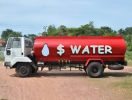 I wrote to Sydney Water in 2021 on this [predictable] looming vital shortage, but received no response at all from Sydney Water, despite their promotion of themselves as concerned about sustainable water use and costs. The letter is published below. The response was nil; complete disinterest. Read into that what you will.
I wrote to Sydney Water in 2021 on this [predictable] looming vital shortage, but received no response at all from Sydney Water, despite their promotion of themselves as concerned about sustainable water use and costs. The letter is published below. The response was nil; complete disinterest. Read into that what you will.
 Dear Sydney Water, I recently received my latest copy of Waterwrap, and wish to comment on aspects of Sydney water management in general. I should point out that only a tiny minority of your customers are as frugal with water usage as I am, so I am not complaining about being restricted. In fact, my usage is about one third of the statistical average, according to your data. This is despite my land being larger than most suburban blocks and my ability to grow so much food
Dear Sydney Water, I recently received my latest copy of Waterwrap, and wish to comment on aspects of Sydney water management in general. I should point out that only a tiny minority of your customers are as frugal with water usage as I am, so I am not complaining about being restricted. In fact, my usage is about one third of the statistical average, according to your data. This is despite my land being larger than most suburban blocks and my ability to grow so much food
 The 'densification' that planners push to accommodate overpopulation drives increasing water pollution risks, along with climate change. “Generally, we expect urbanisation to increase groundwater DOC (dissolved organic carbon) concentrations by up to 19 per cent, compared to agricultural or natural land use, likely as the result of contamination – for example, through leaking septic and sewer systems.” (Research paper.)
The 'densification' that planners push to accommodate overpopulation drives increasing water pollution risks, along with climate change. “Generally, we expect urbanisation to increase groundwater DOC (dissolved organic carbon) concentrations by up to 19 per cent, compared to agricultural or natural land use, likely as the result of contamination – for example, through leaking septic and sewer systems.” (Research paper.)
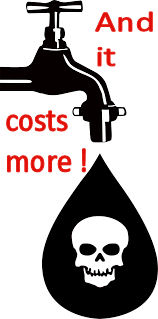
Climate change and urbanisation are set to threaten groundwater drinking water quality, new research from UNSW Sydney shows.
More than half of the world’s population faces a looming threat to the quality and availability of their drinking water because climate change and urbanisation are expected to cause an increase in groundwater organic carbon, a new UNSW study has found.
The research, published in Nature Communications overnight, examined the largest global dataset of 9404 published and unpublished groundwater dissolved organic carbon (DOC) concentrations from aquifers in 32 countries across six continents.
DOC is a naturally occurring component of groundwater, but the higher its concentration, the more difficult and expensive it is to make groundwater drinkable. In Australia, groundwater is widely used as the main source of drinking water for many cities and towns.
Lead author Dr Liza McDonough, of the Connected Waters Initiative Research Centre at UNSW, said the study forecasted elevated DOC concentrations because of projected changes in temperature and rainfall due to climate change, as well as increased urbanisation.
“We identified groundwater DOC concentration increases of up to 45 per cent, largely because of increased temperatures in the wettest quarter of the year – for example, in a number of south-eastern states in the United States. We predict increases in DOC in these locations could increase water costs for a family of four by US$134 per year,” Dr McDonough said.
“Other areas such as eastern China, India and parts of Africa already experience severe groundwater contamination issues. These may be further compounded, particularly in south-eastern China, by groundwater DOC increases associated with large predicted increases in temperature in the wettest quarter of the year by 2050.
“Generally, we expect urbanisation to increase groundwater DOC concentrations by up to 19 per cent, compared to agricultural or natural land use, likely as the result of contamination – for example, through leaking septic and sewer systems.”
The research, a collaboration between UNSW, the Australian Nuclear Science and Technology Organisation (ANSTO), Southern Cross University, British Geological Survey, and the University of Bradford, found four major contributing factors to groundwater DOC levels: climate, land use, inorganic chemistry and aquifer age.
Dr McDonough said increased groundwater DOC, whether naturally occurring or due to contamination, also posed a threat to human health.
“Groundwater is Earth’s largest source of freshwater and provides essential drinking water for more than 50 per cent of the world’s population,” she said.
“But, because most health impacts caused by DOC are related to the formation of by-products of water treatment chlorination and depend on concentrations of other water chemical parameters, the World Health Organization and many countries – including Australia – do not regulate DOC concentrations in drinking water directly.”
Dr McDonough said that while DOC is a naturally occurring, key element of groundwater it could combine with, and transport, potentially dangerous heavy metals otherwise bound to rocks and sediment where groundwater occurs.
“This is a concern when, for example, more than 100,000 lifetime cancer cases in the United States alone can be attributed to drinking water contaminants,” she said.
Dr McDonough said it was important to understand what caused high DOC concentrations in groundwater.
“An increase in groundwater DOC concentration impacts the ability and therefore cost to make groundwater drinkable,” she said.
“For example, we projected a 16 per cent increase in annual household water costs in some parts of the United States because of rising water treatment costs – due to the need to implement additional water treatment measures to remove increased DOC concentrations.
“The decrease in groundwater quality and substantial increase in water treatment costs will also compound existing constraints on groundwater resources, including availability.”
Dr McDonough said the impacts on groundwater DOC levels from climate change and urbanisation, while likely to occur globally, differed by geography and climate.
“Our research found that in arid climates, groundwater DOC concentrations increased with higher rainfall because microbes can better break down organic matter, such as leaves, under warm and increasingly wet conditions,” she said.
“Increased temperatures in arid environments, however, reduced groundwater DOC concentrations because when conditions are too hot and dry, vegetation and organic matter sources are limited.
“By contrast, increased rain in warm and wet environments decreased groundwater DOC concentrations because heavy rainfall dilutes the DOC in groundwater.”
Dr McDonough said she looked forward to conducting further research to determine the best water treatment options for areas where groundwater DOC concentrations are anticipated to increase.
“Our next step is to investigate how the character of DOC changes when you have different aquifer minerals, because some types of organic matter can stick to certain mineral surfaces and ultimately reduce this type of organic matter remaining in the water,” she said.
“This will help provide guidance on the most suitable water treatment options in areas where DOC concentrations are expected to increase.”
Read the full research paper in Nature Communications: https://www.nature.com/articles/s41467-020-14946-1
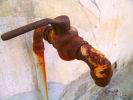 Is this how our politicians and economists deal with water shortage?
Is this how our politicians and economists deal with water shortage?
Oliver Trymble of Uralla writes: "Dear All, I have just emailed the Premier and Barnaby Joyce to tell them that I am starting a social media campaign. (I don’t actually know how to do this, being the wrong generation...). Perhaps you can help.
We have no drinking water in Uralla. [Uralla is an inland town in NSW.] We have to fetch bottled water from out the back of our local shop. For the house-bound and the elderly, this is inadequate.
The state government is building sporting facilities in the city. They are intent on spending millions moving the Powerhouse Museum. Why is drinking water for NSW citizens not a burning priority?
We have no water.
WE HAVE NO WATER.
How can I make my voice heard? And the voices of Merle and Phyllis and Maggie and all the older people of this town?
Please help us."y voice heard? And the voices of Merle and Phyllis and Maggie and all the older people of this town?
Please help us."
Originally posted by Oliver Trymble on his facebook page on December 29, 2019, but the situation is ongoing - see council notices below - although the council recently said it would help people get bottled water if they had difficulty accessing it.
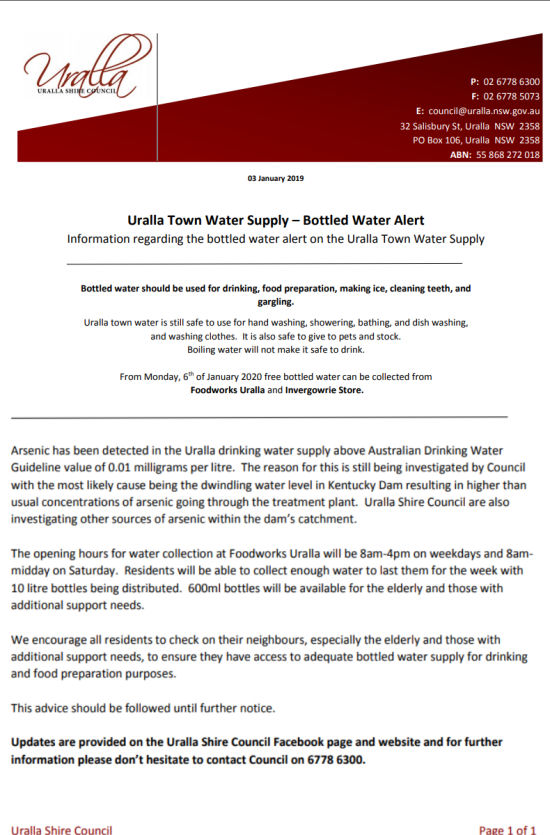
https://www.uralla.nsw.gov.au/Council-Services/Water-Supply/Water
7 January 2020
Uralla Shire Council Bundarra Water Supply
Boil Water Alert
Poor raw water quality or treatment failure
Problems with water treatment mean that drinking water in the Bundarra Water Supply is unsafe due to elevated levels of turbidity in the treated water.
Turbidity is a measure of suspended particles in water.
Water used for drinking or food preparation should be brought to a rolling boil to make it safe. Kettles with automatic shut off switches can do this. Water should then be allowed to cool and stored in a clean container with a lid and refrigerated.
Bottled water or cool boiled water should be used for drinking, washing uncooked food (eg, salad vegetables and fruit), making ice, cleaning teeth, gargling and pet’s drinking water.
Dishes should be washed in hot soapy water or in a dishwasher. Children should take bottled water or cool boiled water to school.
Bottled water is available for collection from the Bridge Store (formerly Bottom Shop) in 30 Bendemeer St, Bundarra Thursday, Friday & Saturday from 10am to 4pm Sunday from 10am to 2pm.
Uralla Shire Council is working to fix the problem.
This advice should be followed until further notice.
For further information contact: 02 6778 6300
Western Reservoir Bundarra - Leak Information
Council is aware of the leak at the Western Reservoir at Bundarra. Full repair of the existing leak will unfortunately require isolation and draining of the reservoir. Due to the current dry conditions, the operational preference is that this work is not done until our water supplies are replenished to limit water loss and disruptions to supply.
As an interim measure, quotations from several contractors have been requested for a temporary crack injection seal, to assist in reducing any water loss until such a time that it would be more appropriate to isolate the reservoir and apply a long term repair solution.
There are two urban centres within the Uralla Shire which have potable water supply schemes: Uralla (population 2400) and Bundarra (population 400). Raw water is sourced from the Gwydir River in Uralla Shire. The surrounding rural areas mainly rely on rainwater tank supplies for domestic water.
Uralla Water Supply
The raw water supply for the Uralla township comes from an on-stream weir (500ML capacity) on Kentucky Creek about 5 km south west of Uralla, and through 85m of pipeline to the water treatment works.
Water is treated by a conventional sedimentation and sand filtration treatment plant with a capacity of 5 ML per day and distributed by a system comprising 3 service reservoirs with a total capacity of 5 ML, 1 pumping station, 11 km of transfer and trunk mains and 27 km of reticulation mains.
Bundarra Water Supply
Raw water is sourced from a pump well adjacent to a depression in the Gwydir River (capacity 120ML) known as Taylors Pond. It is pumped approximately 600m to the treatment works. The water treatment plant has a capacity of 0.8 ML per day (plus a 20% hydraulic loading) and uses conventional sedimentation and sand filtration similar to the Uralla plant. Following treatment, potable water is pumped to two service reservoirs located on the northern and western extremities of the village.
Uralla Town Water Supply Do Not Drink Alert
On Display Indefinitely
Bottled water should be used for drinking, food preparation, making ice, cleaning teeth, and gargling.
Uralla town water is still safe to use for hand washing, showering, bathing, and dish washing, and washing clothes. It is also safe to give to pets and stock. Boiling water will not make it safe to drink.
From Monday, 6th of January 2020 free bottled water can be collected from Foodworks Uralla and Invergowrie Store.
If you know of or have any concerns for friends, family or neighbours that may not be able to access the bottled water available please don't hesitate to contact Council on 6778 6300 so we can ensure they are provided for by our volunteers, organisations and staff.
To download the current Public Notice please click here.
To download the current Frequently Asked Questions questions please click here.
Latest News & Updates
Friday, 24th January 2020 - Uralla Town Water Supply Update
To download the Media Release please click here(PDF, 232KB).
Uralla Shire Council would like to remind the community about the do not drink alert in place for the Uralla Town Water Supply.
“With the rain that has fallen over the last week it has provided some relief to the community and we have seen a decrease in water usage which is fantastic to see,” Acting General Manager Mr David Aber said. “As the do not drink alert has been in place for over a month now we would like to remind the community of the aspects of this alert.”
The Uralla town water supply is safe to use for domestic purposes such as hand washing, showering, bathing, washing the dishes and washing clothes. It is also safe to give to pets and stock. Bottled water should be used for drinking, food preparation, making ice, cleaning teeth, and gargling. Please note that boiling the water will not remove the arsenic.
Council wishes to advise that the do not drink alert does not impact the safety of swimming at Uralla Pool.
“Uralla Pool is safe to swim in and enjoy. We would like to assure the community that the town water is safe to bath and swim in,” Acting General Manager Mr David Aber said. “The pool has free entry for all Uralla Shire residents over the long weekend making it a great opportunity to have a swim and I would like to remind people that the pool is safe for bathing if swallowing of water is limited.”
Incidental ingestion of very small quantities of water at the arsenic levels currently in Uralla Town Water supply does not pose a health risk. The principal health concern with drinking the water relates to the ongoing exposure to arsenic over a period of years.
If you know of or have any concerns for friends, family or neighbours that may not be able to access the bottled water available please don't hesitate to contact Council on 6778 6300 so we can ensure they are provided for by our volunteers, organisations and staff.
Over the past week work has been ongoing on the design for modification of our treatment plant for the installation of a Granular Activated Carbon filter. This work is necessary prior to the purchase and installation of a new filter.
For the latest information and updates please visit Council’s website and Facebook page. Locals and visitors are encourage to phone or email Council if they have any further questions or concerns.
[ENDS]
David Aber – Acting General Manager
For further information contact: Council Tel: 02 6778 6300 Email: [email protected]
Further Information https://www.uralla.nsw.gov.au/Council/Council-News-and-Media/Public-Notices/Uralla-Town-Water-Supply-Do-Not-Drink-Alert
January 2020
To view please click on the links below:
Fact Sheet - Regarding Notice Issued in December 2019 - 24th of January 2020
Media Release - Uralla Town Water Supply Update - 24th January 2020(PDF, 232KB)
Media Release - Uralla Town Water Supply Update - 16th January 2020(PDF, 232KB)
Media Release - Town Water Supply Update - 3rd of January 2020
December 2019
To view please click on the links below:
Media Release - Uralla Town Water Supply Update - 30th of December 2019
Message from the Acting General Manager - Uralla Town Water Supply - 24th of December 2019
Media Release - Uralla Town Water Supply Update - 23rd of December 2019
Media Release - Bottled Water Alert - 19th of December 2019
Public Notice - Uralla Town Water Supply - Do Not Drink - Wednesday 18th of December 2019 at midday
 The Canberra Times mentioned the Regional Australia institute on 11 August 2019 in Regional Australia is ready to grow so let's be ambitious. You may be curious about this Regional Australia Institute, what it is, who runs it, who finances it, what are its aims, and what it has to say about the environment and water.
The Canberra Times mentioned the Regional Australia institute on 11 August 2019 in Regional Australia is ready to grow so let's be ambitious. You may be curious about this Regional Australia Institute, what it is, who runs it, who finances it, what are its aims, and what it has to say about the environment and water.

It is a vehicle for promoting population driven economic growth throughout regional Australia. Its stated vision includes a "Big Australia" fuelled by immigration.
The Chair is Mal Peters, NSW farmer and former President of the NSW Farmers Federation. Apart from him, included on its 6 person Board are Ian Sinclair, Christian Zahra, and Grahame Morris, all former Coalition political identities.
From its Annual Report it seems its revenue comes from governments - in 2018 it received from them (no details of individual contributors) $2,008,829. Given the pro growth policies of all Australian governments that perhaps isn't surprising.
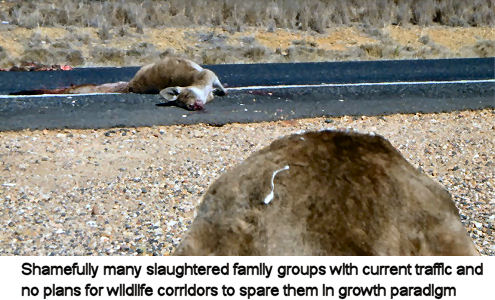
Its all about growth driven economics and jobs.
No mention of environment, particularly water. That's odd, given Mal Peters previous involvement in water issues, being critical of the MDBA and Barnaby Joyce when he was Agriculture and Water Resources Minister (https://www.mdbrc.sa.gov.au/sites/g/files/net3846/f/mdbrc-witness-statement-mal-peters.pdf?v=1534462934). So his chairmanship of a body consciously ignoring the environment is a bit surprising.
And no mention of wildlife or wildlife corridors, despite the fact that the wildlife are not coping with the current rate of traffic and they have no other place to go.
 Some of you may have heard a segment in 'Blueprint for Living' program last Saturday which dealt with water (identified as a finite resource) and in which population growth was mentioned but then went on to discuss several technical solutions and the economics of selling rural/agricultural water to cities where it could command a higher price. The issue of increased demand being within government control through limiting immigration was not discussed. As we have come to expect from the ABC, population growth was a given, an immutable fact. Accordingly I have made a complaint to the ABC as follows:
Some of you may have heard a segment in 'Blueprint for Living' program last Saturday which dealt with water (identified as a finite resource) and in which population growth was mentioned but then went on to discuss several technical solutions and the economics of selling rural/agricultural water to cities where it could command a higher price. The issue of increased demand being within government control through limiting immigration was not discussed. As we have come to expect from the ABC, population growth was a given, an immutable fact. Accordingly I have made a complaint to the ABC as follows:
The segment complained about concerns [over] water supply. < a href="https://www.abc.net.au/radionational/programs/blueprintforliving/water-for-thirsty-cities/11176282">Jonathan Green interviewed Erin O'Donnell and Chris Chesterfield. While a growing population was identified along with water being a finite resource the program then dealt exclusively with technological 'solutions' to increasing demand and probably a worsening situation due to climate change).
Population growth is a policy direction for all our political parties. It is a deliberate political decision in which over 60% of population growth is due to very high immigration. Australia has one of the driest climates and one which is very likely to become drier. Water, a finite resource, is likely to become more limited even while government, opposition and The Greens pursue a policy which gives Australia one of the highest rates of population growth among OECD countries. But your program nowhere suggested that one of the directions that Australia could pursue in managing future water demand is to cut its immigration program and limit those policies which encourage Australians to have children. This is not to 'blame' migrants in any way for Australia's water problems; it is to blame the policy of high population growth pursued by our political parties. Prior to the last few years of the Howard Government Australia's immigration program was a great deal smaller. Returning to this smaller intake would help relieve not just a serious water shortage but a number of other infrastructure deficiencies as well.
I recently complained about a 'Breakfast' program dealing with water in which the interviewee mentioned population growth several times but in which Fran never took up the issue or discussed it.
Many of my colleagues join me in a view that the ABC has a persistent and pervasive bias against dealing with the issue of population growth as population growth relates to so many everyday issues. It is not sufficient to run an occasional program on population; population growth pervades so much of Australia's current life and future that it should also pervade the ABC programs which deal with a wide variety of important issues."
You can listen to the ABC program and write your own complaint. See the last line in my complaint and see why the latter is important.
 To keep up with global food demand, the UN estimates, six million ha of new farmland will be needed every year. Instead, 12 million ha are lost every year through soil degradation. Australia lost 36 million ha of agricultural land in just the four years from 2005 till 2009. Some of this lost land has occurred because of urban sprawl which is swallowing up some of our best soils close to cities that used to supply the fresh fruit and vegetables. A scathing report by the Royal Commission has gone as far to accuse the Murray-Darling Basin Authority (MDBA) of negligence and being "incapable of acting lawfully," apparently because they overestimated the amount of water returned to the river by a factor of ten. The many warning signs all around us are continually ignored by politicians obsessed with economic theories that defy even the basic laws of mathematics.
To keep up with global food demand, the UN estimates, six million ha of new farmland will be needed every year. Instead, 12 million ha are lost every year through soil degradation. Australia lost 36 million ha of agricultural land in just the four years from 2005 till 2009. Some of this lost land has occurred because of urban sprawl which is swallowing up some of our best soils close to cities that used to supply the fresh fruit and vegetables. A scathing report by the Royal Commission has gone as far to accuse the Murray-Darling Basin Authority (MDBA) of negligence and being "incapable of acting lawfully," apparently because they overestimated the amount of water returned to the river by a factor of ten. The many warning signs all around us are continually ignored by politicians obsessed with economic theories that defy even the basic laws of mathematics.
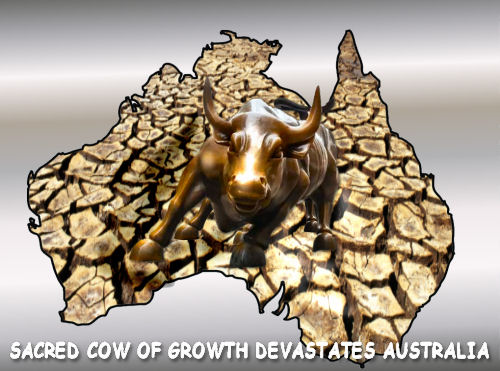
Australia is the sixth largest country in the world and also the driest inhabited continent on earth, with the least amount of water in rivers, the lowest run-off and the smallest area of permanent wetlands of all the continents.
Its ocean territory is the world's third largest, spanning three oceans and covering around 12 million square kilometers.
One third of the continent produces almost no run-off at all and Australia's rainfall and stream-flow are the most variable in the world.
Australia also has some of the oldest land surface on earth and, while rich in biodiversity, its soils and seas are among the most nutrient poor and unproductive in the world. This is due mainly to the country's geological stability, which is a major feature of the Australian land mass, and is characterized by, among other things, a lack of significant seismic activity.
Only six per cent of the Australian landmass is arable. As a result, agricultural yields are low compared to other nations: German farms produce over nine metric tonnes/ha compared to Australia's two tonnes.
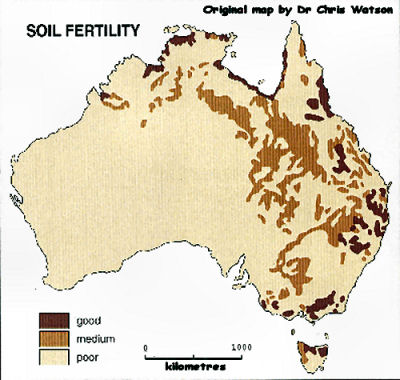
Australian soils are highly dependent upon vegetation cover and insect biomass to generate nutrients and prevent erosion. It is the native vegetation's long root systems that help break down the sub soil and bring nutrients to the surface, while insects, bacteria, and small animals, reduce ground litter and add nitrogen.
Land clearing, water extraction and poor soil conservation are all causes of a decline in the quality of Australia's soils, now the collapse of insect populations adds another blow. [1]
The two most significant direct causes of land degradation are the conversion of native vegetation into crop and grazing lands, and unsustainable land-management practices.
Other factors include the effects of climate change and loss of land to urbanization, infrastructure and mining.
However, the underlying driver of all these changes is rising demand from growing populations for food, meat and grains, as well as fibre and energy. This in turn leads to more demand for land and further encroachment into areas with marginal soils.
Market deregulation, which has been a trend since the 1980s, can lead to the destruction of sustainable land management practices in favor of monocultures and can encourage a race to the bottom as far as environmental protection is concerned. The 2016 State of the Environment report noted that:
”Current rates of soil erosion by water across much of Australia now exceed soil formation rates by an order of magnitude or more. As a result, the expected half-life of soils (the time for half the soil to be eroded) in some upland areas used for agriculture has declined to merely decades.”
The carbon content of Australian soils, which is a measure of fertility, is now some five to 10 times lower than when measured in 1845. The UN has warned that there could be as little as 60 harvests remaining before the world's soils in places like Australia reach the limits of agricultural production.
To keep up with global food demand, the UN estimates, six million ha of new farmland will be needed every year. Instead, 12 million ha are lost every year through soil degradation. Australia lost 36 million ha of agricultural land in just the four years from 2005 till 2009. Some of this lost land has occurred because of urban sprawl which is swallowing up some of our best soils close to cities that used to supply the fresh fruit and vegetables.[2]
Despite this, agricultural products accounted for 15 per cent of Australia’s total exports in 2015-16, and the gross value of farm production was more than $63 billion largely because we currently have around two ha of arable land per person, one of the highest rates in the world.
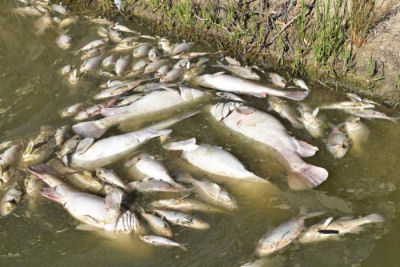
However 40% of that production came from the Murray Darling irrigation area which had high production based on historic over-allocation of water, something that has now come back to bite us. A scathing report by the Royal Commission has gone as far to accuse the Murray-Darling Basin Authority (MDBA) of negligence and being "incapable of acting lawfully," apparently because they overestimated the amount of water returned to the river by a factor of ten.
With our highly variable surface water supply, groundwater resources are critical for many Australian communities and industries. In some cases, groundwater is the only reliable water supply available to support towns, agriculture and the resources sector. Australia is a very dry country so groundwater is extensively used right across the continent.
Perth relies heavily on the Gnangara Mound aquifer for its water supply, but the water table has been dropping for the past 40 years or more because of reduced rainfall, increased extraction, and decreased recharge.
The Great Artesian Basin, underlying about 1.7 million square kilometres of Australia, contains about 65,000 km3 of water, but it is a “Fossil water”, being up to 2 million years old, so extraction is far faster than replenishment.
It is not widely understood that vegetation and many streams and rivers are supported by the availability of groundwater, either as discharge into streams and rivers or through groundwater uptake by plant roots directly.
In the Northern Territory, Palm Valley has an average rainfall of only 200mm, but spring fed pools allow its unique flora to survive. The same applies for the Doongmabulla Springs Complex, a one-square-kilometre expanse of nationally important wetlands near the proposed site of the Carmichael coal mine in Queensland, which would probably be destroyed if Adani is allowed to extract the water it needs.
As the pressure in the Great Artesian Basin has declined and the water table drops, mound springs (where groundwater is pushed to the ground surface under pressure) have begun to dry up in South Australia and Queensland.
Associated paperbark swamps and wetlands are also being lost and it gets more and more expensive to extract the groundwater for irrigation and other commercial applications. On average, rates of groundwater extraction across Australia have increased by about 100 per cent between the early 1980s and the early 2000s, reflecting both our increased population size and the associated commercial usage of groundwater stores.
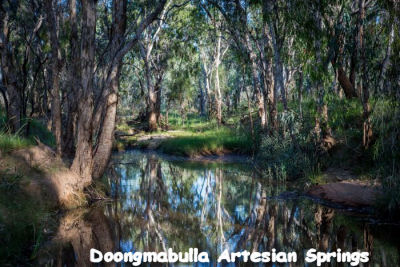
We are also putting these resources at risk from pollution. Already there have been many incidences of ground water being polluted by petroleum products, chemicals, fertilizers, pesticides, salt and even nuclear waste. However the main aquifers are being put at risk from fracking, acid leaching of minerals like uranium and underground coal gasification.
Converting the aquifer’s recharge area into farmland is likely to increase the level of nitrogen compounds while the large blasting used in open cut mining is fracturing rock formations deep underground, allowing contamination of water from above or intermingling with salty water.
All of which explains why scientists have been warning us for years that we cannot continue to grow without doing great damage to our fragile nation, but they are continually ignored by politicians obsessed with economic theories that defy even the basic laws of mathematics.
and......
Underground Coal Gasification was trialed and was proved to have failed in three sites in Queensland with the operator gas company Linc Energy charged with five counts of wilful and unlawful environmental harm. They faced penalties of up to $9 million but were declared bankrupt, leaving the Qld government with a clean up bill of $80m.
Despite this, a similar plant at Leigh creek has been given the green light after a failed challenged by the Adnyamathanha people in the Supreme Court of South Australia. The chairman of Leigh Creek energy claimed that Linc energy was a great company and that there was no environmental damage. Well he would have to say that since he was also chairman of Linc before they went broke.
The House Standing Committee on the Environment and Energy will hold a public hearing tomorrow for its inquiry into the management and use of Commonwealth environmental water.
The Committee will hear from the National Farmers’ Federation and the National Irrigators’ Council.
The inquiry is focused on the role of the Commonwealth Environmental Water Holder, including how environmental water is being used, the outcomes achieved and options for improving community engagement.
Further information about the inquiry can be found on the inquiry website at www.aph.gov.au/environmentalwater.
Public hearing details:
Time: 9.50am – 11.10am
Date: Wednesday 23 May 2018
Location: Committee Room 1R1, Parliament House, Canberra
Interested members of the public may wish to track the committee via the website, www.aph.gov.au/environment. Click on the blue ‘Track Committee’ button in the bottom right hand corner and use the forms to login to My Parliament or to register for a My Parliament account.
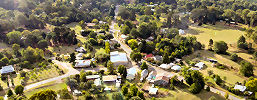 The Stanley Plateau nestled in the foothills of the Victorian Alps, is fighting for the right to preserve its water resources from extraction by a company that transports the water to a plant in Albury, across the border in NSW, for bottling. The bottled water from Stanley and surrounding areas is for domestic and overseas distribution processed by a multi-national company. Stanley has commenced fund raising for the next stage of the Cue Springs Water Challenge - an appeal to the Victorian Court of Appeal. The website http://stanleywater.org.au/ invites a contribution to the fundraising appeal. Please distribute the webpage through your networks as Stanley needs all the help it can get. Stanley is a small Australian community fighting for its water and needs your help.
The Stanley Plateau nestled in the foothills of the Victorian Alps, is fighting for the right to preserve its water resources from extraction by a company that transports the water to a plant in Albury, across the border in NSW, for bottling. The bottled water from Stanley and surrounding areas is for domestic and overseas distribution processed by a multi-national company. Stanley has commenced fund raising for the next stage of the Cue Springs Water Challenge - an appeal to the Victorian Court of Appeal. The website http://stanleywater.org.au/ invites a contribution to the fundraising appeal. Please distribute the webpage through your networks as Stanley needs all the help it can get. Stanley is a small Australian community fighting for its water and needs your help.
The Stanley Plateau is entirely dependent on rainfall for its existence. The residents of Stanley do not have access to a municipal water supply. They provide their own water for domestic and farming uses by accessing bores that draw water from groundwater aquifers, pump from creeks and streams, many of which are tributaries to rivers and dams that supply water to surrounding towns and villages, or by collecting rainwater in tanks.
Rich soils support thriving agriculture and horticulture production, and cattle and sheep farming. Stanley is known for its high-quality nut, berry, apple, and pear production, as well as cottage industries that produce high quality preserves and other products.
First class bed and breakfast accommodation supports thriving touris activity with visitors drawn to the area by farm door sales, in-season pick your own berries, and access to the beauty of Alpine flora and fauna through the four seasons. Spring and Autumn in the alpine country is spectacular. All this depends on access to high quality water. Depletion of Stanley’s water resources causes much anxiety in a community dependent upon annual rainfall for its existence.
At the moment it is chestnut harvest season. Approximately 500 tonnes of chestnutswill be harvested over the next few months. It is worth at least $A2M to local growers. Many will benefit; growers and their families; pickers, haulage companies; local businesses and other services. These benefits all derive from the rain that falls on Stanley.
There are no social, economic or environmental benefits for Stanley from the extraction and bottling of its groundwater. There are social, economic and environmental benefits to Stanley and the surrounding area by letting the water remain in the aquifer for access by the local community.
Please support us by contributing through this website: http://stanleywater.org.au/
 There is a humanitarian catastrophe unfolding in Syria and the "western" media ignore it. On December 22 al-Qaeda aligned Takfiris in the Wadi Barada valley shut down the main water supply for the Syrian capital Damascus. Since then the city and some 5-6 million living in and around it have to survive on emergency water distributions by the Syrian government. That is barely enough for people to drink - no washing, no showers and no water dependent production is possible. Article originally published at Moon of Alabama. Sources of pictures and enlargements also available there.
There is a humanitarian catastrophe unfolding in Syria and the "western" media ignore it. On December 22 al-Qaeda aligned Takfiris in the Wadi Barada valley shut down the main water supply for the Syrian capital Damascus. Since then the city and some 5-6 million living in and around it have to survive on emergency water distributions by the Syrian government. That is barely enough for people to drink - no washing, no showers and no water dependent production is possible. Article originally published at Moon of Alabama. Sources of pictures and enlargements also available there.
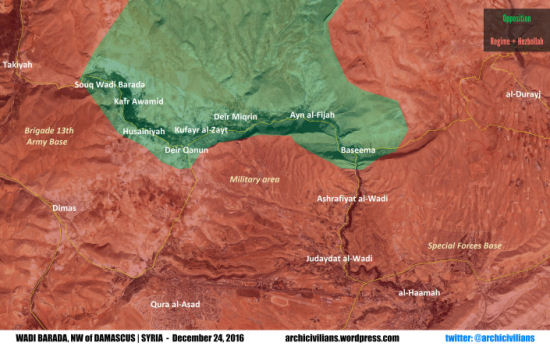 This shut down is part of a wider, seemingly coordinated strategy to deprive all government held areas of utility supplies. Two days ago the Islamic State shut down a major water intake for Aleppo from the Euphrates. High voltage electricity masts on lines feeding Damascus have been destroyed and repair teams, unlike before, denied access. Gas supplies to parts of Damascus are also cut. A similar tactic was used by the Zionist terrorists of the Haganah who in 1947/48 poisoned and blew up the water mains and oil pipelines to Palestinian Haifa.
This shut down is part of a wider, seemingly coordinated strategy to deprive all government held areas of utility supplies. Two days ago the Islamic State shut down a major water intake for Aleppo from the Euphrates. High voltage electricity masts on lines feeding Damascus have been destroyed and repair teams, unlike before, denied access. Gas supplies to parts of Damascus are also cut. A similar tactic was used by the Zionist terrorists of the Haganah who in 1947/48 poisoned and blew up the water mains and oil pipelines to Palestinian Haifa.
Wadi Barada is a river valley some 10 miles west of Damascus at the mountain range between Lebanon and Syria. It has been in the hands of local insurgents since 2012. The area was since loosely surrounded by Syrian government forces and their allies from Hizbullah.
Two springs in the area provide the water for Damascus which is treated locally and then pumped through pipelines into the city's distribution network. Since the early 1990s there is a low level conflict over the water diversion of the Barada river valley to the ever growing Damascus. The drought over the last years has intensified the problems. Local agriculture of the water rich valley had to cut back for lack of water as this was pumped into the city. But many families from the valley moved themselves into the city or have relatives living there.
The local rebels had kept the water running for the city. Al-Qaeda aligned groups have been in the area for some time. A propaganda video distributed by them and taken in the area showed (pic) the choreographed mass execution of Syrian government soldiers.
After the eastern part of the city of Aleppo was liberated by Syrian government forces, the local rebels and inhabitants in the Barada river valley were willing to reconcile with the Syrian government. But the al-Qaeda Takfiris disagreed and took over. The area is since under full al-Qaeda control and thereby outside of the recent ceasefire agreement.
On December 22 the water supply to Damascus was suddenly contaminated with diesel fuel and no longer consumable. A day later Syrian government forces started an operation to regain the area and to reconstitute the water supplies.
Photos and a video on social media (since inaccessible but I saw them when they appeared) showed the water treatment facility rigged with explosives. On Dec 27th the facility was blown up and partly destroyed.
Suddenly new organized "civil" media operations of, allegedly, locals in the area spread misinformation to "western" media. "There are 100,000 civilians under siege in Wadi Barada!" In reality the whole area once had, according to the last peacetime census, some 20,000 inhabitants. The White Helmets propaganda organization now also claims to be in the area. "The government had bombed the water treatment facility," the propaganda groups claimed.
That is a. not plausible and b. inconsistent with the pictures of the destroyed facility. These show a collapse of the main support booms of the roof but no shrapnel impact at all. A bomb breaking through the roof and exploding would surely have left pocket marks all over the place. The damage, in my judgement, occurred from well designed, controlled explosions inside the facility.
Some insurgents posted pictures of themselves proudly standing within the destroyed facility and making victory signs.
There is more such cheer-leading by insurgents on social media. Why when they claim that the government bombed the place?
On December 29 the UN Office for the Coordination of Humanitarian Affairs issued an alarm about the water crisis:
The United Nations is alarmed that four million inhabitants in Damascus and surrounding areas have been cut off from the main water supply since 22 December. Two primary sources of drinking water- Wadi Barada and Ain-el-Fijah-which provide clean and safe water for 70 percent of the population in and around Damascus are not functioning, due to deliberate targeting resulting in the damaged infrastructure.
One of the two springs, Al-Feejeh, has now been retaken by the Syrian army. 1,300 civilians from Ain AlFeejeh, the nearby town with the treatment facility, have fled to the government held areas and were taken in by the Syrian Red Cross. The other spring and the treatment facility are still in Takfiri hands. The government has said that it will need some ten days to repair the system after the Syrian army has gained control of the facilities. That will still take some time.
Western media have hardly taken notice of the water crisis in Damascus and their coverage seems to actively avoid it. A search for Barada on the Washington Post website brings up one original piece from December 30 about the freshly negotiated ceasefire. The 6th paragraph says:
Airstrikes pounded opposition-held villages and towns in the strategically-important Barada Valley outside Damascus, activists said, prompting rebels to threaten to withdraw their compliance with a nationwide truce brokered by Russia and Turkey last week.
Then follow 16 paragraphs on other issues. Only at the very end of the piece comes this (mis-)information:
The Barada Valley is the primary source of water for the capital and its surrounding region. The government assault has coincided with a severe water shortage in Damascus since Dec. 22. Images from the valley’s Media Center indicate its Ain al-Fijeh spring and water processing facility have been destroyed in airstrikes. The government says rebels spoiled the water source with diesel fuel, forcing it to cut supplies to the capital.
On December 29 a piece by main WaPo anti-Syria propagandist Liz Sly did not mention the water crisis or the Barada valley at all.
The New York Times links a Reuters pieces about the UN alarm about the water crisis. But I find nothing in its own reporting that even mentions the water crisis. One piece on December 31 refers shortly to attacks on Wadi Baradi by government forces at its very end.
A Guardian search for Barada only comes up with a piece from today mixed from agency reports. The headlines say "Hundreds of Syrians flee as Assad's forces bomb Barada valley rebels". The piece itself says that they flee to the government side. In it the Syrian Observatory (MI-6) operation in Britain confirms that al-Qaeda rules the area which "Civil society organisations on the ground" deny. Only the very last of the 12 paragraph piece mentions the capital:
The Barada valley is the primary source of water for the capital and its surrounding region. The government assault has coincided with a severe water shortage in Damascus since 22 December. The government says rebels spoiled the water source with diesel fuel, forcing it to cut supplies to the capital.
Surely a few people "fleeing" (to the government side) "as Assad's forces bombs" are way more important than 5 million people in Damascus without access to water. That the treatment facility is destroyed seems also unimportant.
All the above papers have been extremely concerned about every scratch to any propaganda pimp who had claimed to be in then rebel held east-Aleppo. They now show no concern at all for 5 million Syrians in Damascus who have been without water for 10 days and will likely be so for the rest of the month.
Posted by b on January 2, 2017 at 02:42 PM | Permalink

Privatisation on the backfoot as new book shows that the growing wave of cities putting water back under public control has now spread to 37 countries impacting 100 million people.
Our Public Water Future(pdf, 1.67 MB)
Privatisation on the backfoot as new book shows that the growing wave of cities putting water back under public control has now spread to 37 countries impacting 100 million people.
Our public water future: The global experience with remunicipalisation details the growing wave of cities and communities worldwide that are bringing water services back under public control.
The book was launched in the run-up to the World Water Forum in South Korea (12-17 April) and comes in the wake of Jakarta’s decision in March 2015 to annul its privatised water contracts citing the violation of the 9.9 million residents’ human right to water.
This is the largest remunicipalisation in the world, suggesting that water privatisation is running out of steam and the pendulum is swinging back in favour of a reinvigorated, accountable and sustainable public control of water.
The TNI book is co-published jointly by the Transnationalinstiture with Public Services International Research Unit (PSIRU), Multinationals Observatory, European Public Services Union (EPSU) and the Municipal Services Project (MSP).
Key findings of the book
Water remunicipalisation refers to the return of previously privatised water supply and sanitation services to municipal authorities, and is also broadly used to refer to regional and national-level services in some cases.
Between March 2000 and March 2015, researchers have found:
From Jakarta to Paris, from Germany to the United States, this book draws lessons from this growing movement to reclaim water services. The authors show how remunicipalisation offers opportunities for developing socially desirable, environmentally sustainable and quality water services benefiting present and future generations. The book engages citizens, workers and policy makers in the experiences, lessons and good practices for returning water to the public sector.
Pages: 132
News: new articles are added to Eau publique, eau d’avenir in June 2015 (French edition of Our Public Water Future).
Find English translation.
News: new article is added to Un futur per l’aigua pública in September 2015 (Calatan edition of Our Public Water Future).
Find English Translation
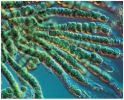
 Entirely predictably, the Murray Darling river system is toxic with effluent again, host to masses of poisonous cyanobacteria. As the Weekly Times reports, "WATER will be switched off to hundreds of farmers and town residents in the Mallee this week as the Murray River blue-green algae emergency worsens. The toxic outbreak now involves almost 500km of the Murray River and has claimed reservoirs, rivers, wetlands and parts of Victoria’s two biggest irrigation districts. Taps were turned off to towns and farms in parts of the southern Mallee late Friday when the algal bloom reached key Wimmera Mallee pipeline pumps near Swan Hill, catching most residents unaware. Experts said a record autumn heatwave, with temperatures soaring above 40C in northwest Victoria this week, was expected to grow the algal bloom until it choked almost all of the Murray River along the NSW-Victoria border within weeks."[1] But these problems have been known for so long now, it seems foolish to believe that we can hope for any resolution that would keep the vast Australian desert from claiming on our only major inland river system. Certainly we should not meddle with the northern river systems, but unfortunately our psychopathic leaders have already started.
Entirely predictably, the Murray Darling river system is toxic with effluent again, host to masses of poisonous cyanobacteria. As the Weekly Times reports, "WATER will be switched off to hundreds of farmers and town residents in the Mallee this week as the Murray River blue-green algae emergency worsens. The toxic outbreak now involves almost 500km of the Murray River and has claimed reservoirs, rivers, wetlands and parts of Victoria’s two biggest irrigation districts. Taps were turned off to towns and farms in parts of the southern Mallee late Friday when the algal bloom reached key Wimmera Mallee pipeline pumps near Swan Hill, catching most residents unaware. Experts said a record autumn heatwave, with temperatures soaring above 40C in northwest Victoria this week, was expected to grow the algal bloom until it choked almost all of the Murray River along the NSW-Victoria border within weeks."[1] But these problems have been known for so long now, it seems foolish to believe that we can hope for any resolution that would keep the vast Australian desert from claiming on our only major inland river system. Certainly we should not meddle with the northern river systems, but unfortunately our psychopathic leaders have already started.
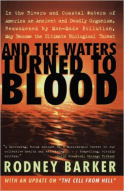
People have asked me to republish a letter written in 1937 about this very problem. I have done so below, but if you really want to understand the horror of this phenomenon, get hold of a copy of Rodney Barker's tale of a scientist trying to blow the whistle on the pfisteria infestation on the Mississipi in the mid 1990s and probably still today. There and here it is the product of too much fertiliser and effluent going into too little water. This is among the best pieces of science writing I have ever read. The life-forms that toxic algae take and their ability to affect the nervous systems of animals large and small - notably humans and baby humans - outdoes the monster from the Black Lagoon and is very very real and very little recognised.
Letter to the editor of the Argus Newspaper, 6 February 1937: Sir. - Your leading article "Nature Takes Revenge" in the Issue of Saturday is a valuable history of man's expansion to the outer continents from Europe. It states the basic laws under which man is allowed by Nature to add to his wealth and comfort. It also states the inevitable disaster that follows the contravention of these laws. The final sentence leaves the way open for constructive action in a manner which impels me to contribute a suggestion for the urgent consideration of my fellow Australians.
This isolated continent is the most recent of the earth's land masses to suffer the occupancy of civilised man. It is undeniable that in the century and a half that we and our antecedents have been here we have made a success of it - if success be measured by material and social progress. It is also undeniable that we have a duty to leave our
successors as good or a better land than we have enjoyed. If we do not learn by the mistakes that time is now revealing in other countries we are falling in our trust. The repeated stories of floods and disaster that come to us from .America are clear evidence of the errors of the systems of occupation of a few centuries ago. Are we yet taking action
to avoid those mistakes?
There is ample evidence that we are not.
Erosion, flood, and soil drift are three terrors alone that we are beginning to experience in the same way as other countries of comparatively recent settlement. To avoid these disasters, are we taking all the action possible that trained men recommend?
It is a sad fact that we are not.
There has been a remarkable growth this century in the universal education of our people in regard to the value and functions of trees and forests. But it is incomplete, and has not yet led to the necessary political action to safeguard the future.
Do Australians realise what uncontrolled settlement has done to their great river, the Murray?
Ninety years ago 51 per cent of its annual flow came down in winter months and 49 per cent in summer. Today 76 per cent is winter flow and 24 per cent, summer.
This is a unique illustration of the regulating value of forest-clad watersheds. Do Australians know that, since the Burrinjuck dam was finished, 12,000,000 cubic feet of silt has accumulated in it? Do the taxpayers who have built the Hume weir realise that only half its watershed is under control, and that the other half, in private ownership, may be cleared and burnt as cleanly as its owners wish, and that such operations must inevitably hasten the silting up of the huge lake, so that perhaps in 100 years it will not exist and cannot be remade? Do Australians realise that settlement in all States has taken place, and is still taking place, under Lands departments which dominate the trained officers of the Forests departments?
Do Australians realise that the chief product of their forests is not the lovely timber that they yield, but water and its regulation, which is the factor limiting the immediate population and future prosperity of their continent? ? Is it known that each year trained forest officers make an analysis of the causes of the fires that occur in our forests, and
that each year they report that more than half of them are caused deliberately? It is known by every interested party that for a few thousand pounds collected each year by Lands departments, holders of grazing licences or their agents, or their delayed-action candles, cause fires that burn out mountain sides of perfect watershed in return for precarious grazing for a few head of cattle.
Do Australians mind? Do they wish to save these appalling yearly losses and attain a balance that will prolong the future indefinitely in progress, prosperity, and peace from flood, fire, and denudation? If they do wish these things, much can be done to that end, but it must be done in the next few years. In a few more years it will be too late.
The first thing to be done is political. Let each State that wishes to ensure its future place all its Crown lands under the absolute control of its Forests Department. Let the forest officers of the State-men who are trained in the great fundamental science of forestry be the only authority who shall say what is to go on in those areas, and who shall enter them.
If tourists, graziers, settlers, or even Lands Department officers want access to those areas, let it be only with the approval of the Minister for Forests on the recommendation of
his experts.
This is the obvious first step to avoid the appalling mistakes that other countries have made and this country is still making. Such a step is above the factions of party politics, and far above the feelings and jealousies of departmental officers. It is no censure on Lands departments that the administration of Crown lands should be removed from their control. It is an archaism that they should so remain.
When Lands departments were given control of Crown lands the great science of forestry had not formulated the laws that govern the fundamental requirements of modern national life. For example, the urban consumption of water has Increased tenfold a head in the last 100 years, and cities are larger, and likely to become larger and even more extravagant. It is only by the application of the principles of sound forestry that supplies of the necessary volume will be available to the population this country may be called upon to sustain. It is no shame upon Lands Department officers that they have not the expert knowledge to provide these requirements. It is not their job.
It is shame upon us that we allow, by an inverted system of administration, the experts to be subservient to the layman. Should this change be wrought by public clamour or far-seeing governmental action, I believe that within 10 years the fire-loss alone would be so reduced that the people of our country would be encouraged to feel that the awful damage of the past was being reclaimed, and that Australia was doing something to reclaim the unrelenting desert creep that threatens us today.
Russell Grimwade, 6 February 1937.
The introduction to this article cited from Chris McLennan, "Water crisis worsens as Murray River blue-green algae spreads," Weekly Times
March 8, 2016
 Thanks for the invitation to be involved in your recent Water leadership workshop. I enjoyed the experience.
Thanks for the invitation to be involved in your recent Water leadership workshop. I enjoyed the experience.
Regarding my point about population in the notes you took and have reproduced below, I think your notes play down the problem and don’t reflect the entirely of what I said.
On the current trajectory Melbourne would be 8+ million by 2050- just 34 years away. And it is irresponsible to represent the issue as having any chance of stopping there.
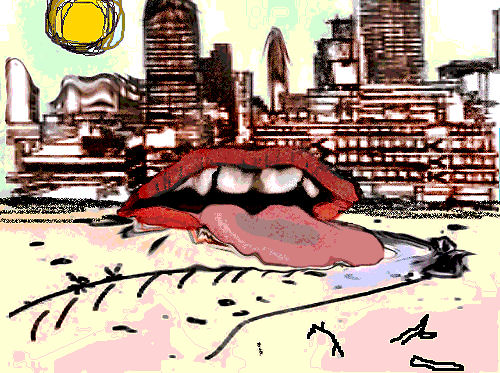 The current growth rate means population would double every 38 years approximately. So by 2088 Melbourne would be 16+ million, and heading for 20 million by end of this century. Should or could we still be using your suggested 100 litres pp by then?
The current growth rate means population would double every 38 years approximately. So by 2088 Melbourne would be 16+ million, and heading for 20 million by end of this century. Should or could we still be using your suggested 100 litres pp by then?
Clearly there is no logical end point on the business as usual model we are on. It is those people that continue to promote BAU who are the dangerous radicals in my opinion. They are prepared to threaten humanity, society and community in order to pursue their ideology. Sound familiar?
We need a campaign to change Australians' view on this issue. Great campaigns have been run in the past to change Australians' views on many important public health and safety issues like smoking, drink driving, safer workplaces, asbestos regulation etc., We’ve successfully changed how we all think about people who behave in ways that threaten our health and safety. Time to use those strategies on the business and climate dinosaurs who pose threats to our very existence.
We need to dismantle the economic model that these dinosaurs have created for themselves, not just re-arrange it. Time for a steady state economy and stable population – see http://www.steadystate.org
This is what I think EV should be working towards- everything else is just tinkering with a fundamentally flawed and dangerous model. And, as I said at the workshop, we are all going to get dispirited and exhausted running endless campaigns trying to push back against every outrage that the current system will continue to produce. Where's the sense - or indeed pleasure- in that?
Cheers,
Jenny Warfe
From: Adele Neale [...]
Sent: Friday, December 11, 2015 5:09 PM
To: warfej [...]
Subject: Thanks - Six Steps to Water Leadership workshop
Dear friends
Thanks so much for coming to our ‘Six Steps to Water Leadership’ workshop in Frankston last week. We had a great discussion and you raised many useful and interesting points. These are summarised in the workshop notes included below.
We will be using your feedback to strengthen the Six Steps report. We can already see key areas around education (maybe a new step!) and more on capturing and using stormwater. We will use the revised report as our submission to the State Water Plan Discussion Paper which is due out in February 2016. More on that in the New Year!
If you have any more thoughts or feedback please get in touch – Juliet, 9341 8106, [email protected].
The report is available here.
And we would love to see you at Environment Victoria's End-of-Year party on Tuesday! It will be a fun and casual event to celebrate Environment Victoria volunteers' efforts, at the rooftop garden at our office building, 60 Leicester St, Carlton, from 5.30pm. Please RSVP here so that we can provide food and drinks for everyone.
Thanks again for your great input, conversation and care for protecting our waterways,
Juliet and Adele
6 Steps to Water Leadership
Frankston workshop notes
General questions and discussion
Water grid? Pipeline, Desalination plant – how are these to be used?
Filling Victoria’s coal mines? Hydro?
Planting trees to hold water in the landscape and create more rain?
Send snail mail to politicians, ministers – they must respond.
Education - How do we get people to care about rivers?
Should be the first Step. Engage in community broadly
In schools. Currently only basic concepts in young years.
Tread lightly, care for your ecological footprint, e.g. reduce meat consumption
Large population, and growing - 8 million people to share the water. Our society is reliant on the number of houses increasing, growth model.
Reducing consumption is also important.
Focusing on Step 1 – A Murray-Darling Basin Plan that restores our rivers, wetlands and national parks
Farmers – move to growing types of food that don’t need much water
In food costs we don’t pay for environmental damage
Cover dams to prevent evaporation
Globalisation of agriculture. E.g. High Chinese demand for baby formula
Focusing on Step 2 – A statewide plan for towns and cities
Education
Water restrictions
Indoor as well as outdoor
Meter monitoring
A personal water use target e.g. 100 litre/person/day to be used
Encourage water tanks
Reduce added bill cost so that water use makes up bigger proportion – there are pros and cons for taking this approach
Green star ratings for buildings
Retrofit
Businesses and residential
Kingston City Council and schools are doing well on this (and this helps with education)
Indigenous plants – they have low water needs
Art exhibition and fundraiser
Cow on Yarra float during Moomba Festival
Culture – use Man From Snowy River
Raingardens. Slow the passage of water moving through the environment.
Focussing on Step 3 – A VEAC inquiry into freshwater ecosystems
What is VEAC? Its purpose is to provide advice to the government. It is a statutory authority. The minister decides what VEAC does work on. You can see VEAC reports are on the website. There has been nothing done on water for 20 years.
Focusing on Step 4 – Reform the Water Act
What determines entitlement to water shares?
Sustainable caps – people use 1/3, rivers get 2/3
Change the Act – no ministerial discretion in decision making
 Confused about what the US and NATO are doing about Syria? Not satisfied with explanations in the mainstream press? Worried that we are promoting more refugees instead of peace in the region? This article gives a very good simple overview of the history and society in Syria, regional religious pressures, recent events and politics, including water theft, background to ISIS, and Turkey's role in opening the refugee floodgates towards Europe. This article represents the text of a talk at a panel on Syrian refugees given by the author in the United States. You can read more of Judy's work on The Deconstructed Globe.
Confused about what the US and NATO are doing about Syria? Not satisfied with explanations in the mainstream press? Worried that we are promoting more refugees instead of peace in the region? This article gives a very good simple overview of the history and society in Syria, regional religious pressures, recent events and politics, including water theft, background to ISIS, and Turkey's role in opening the refugee floodgates towards Europe. This article represents the text of a talk at a panel on Syrian refugees given by the author in the United States. You can read more of Judy's work on The Deconstructed Globe.
Syria is a very old ‘country’. Al Sham has been a self-identified and cohesive region for millennia. Damascus was the second center of the Islamic Caliphate [1] after Mohammad’s death (Mecca was first). The Caliphate, in many ways, had more in common with the Syrian Republic than with the Islamic State. There was religious and ethnic diversity, tolerance and respect for the history of the local peoples.
After WWI, Syria rejected a foreign king and instituted an elected parliament and president. It was a French Mandate until after WWII when it became an independent republic, with a secular and socialist government. The Baath party has been privileged in the constitution since the brief period when Syria was bonded to Egypt in a single socialist republic from 1958-1961 This was changed in a 2012 when the constitution was rewritten by a committee commissioned by Bashar Assad with representation from any opposition group willing to come forward and participate.
Syria has many Christians, and diverse sects of Islam are represented there beyond Sunni and Alawite. There were many Jews in Syria as well before the conflict with Israel caused them to leave. Syrians have lived in peace together for a very long time. Greater Syria includes the ancient lands of the Jews and the birthplace of Christ as well as the center of the first Caliphate after the death of Mohammad.
 Sunnis are not closed out of the Syrian government or slighted by it. Although the Assads are Alawite, the Parliament of Syria, the massive bureaucracy that handles the day to day affairs of government and the Syrian Arab Army reflect the demographics of the society at large, meaning that they are mostly Sunni. There are many wealthy Sunnis in Damascus and Aleppo and many of them have government ties.
Sunnis are not closed out of the Syrian government or slighted by it. Although the Assads are Alawite, the Parliament of Syria, the massive bureaucracy that handles the day to day affairs of government and the Syrian Arab Army reflect the demographics of the society at large, meaning that they are mostly Sunni. There are many wealthy Sunnis in Damascus and Aleppo and many of them have government ties.
Despite the war, the President and his cabinet, the parliament, the bureaucracy and the army continue to govern the central areas of the country
At least 2/3 of displaced people from Syria are in the government controlled area of Syria where they receive government assistance and remain a part of Syrian society.
Drought had caused the destruction of many small farms. Yes, Global warming played a part. But there was a political aspect to the problem as well. Turkey had a built a new dam upstream on the Euphrates and was retaining their full portion of the diminished water supply.[2] Also, Israel had turned the streams from the Golan that once nourished Syrian lands back into Israel.[3]
Bashar Assad was attempting to reintegrate the economy with the US run ‘global economy’, which had a directly negative effect on the welfare of poor people. Like other developing nations, Syria faced a choice between isolation and sanctions, or austerity and essentially pillage by corporate vultures. Like many of his generation, Bashar Assad felt that in the long run, it was best to end isolation. He modernized Syria’s education system (which is free) and started promoting classes in Arabic for foreigners. While some of the elite became very rich, the poorest people suffered with diminished state subsidies for bread and gasoline.
There was bad blood between the Assad family and the Muslim Brotherhood due to past incidents. However, the MB in Syria are hostile not only to Alawites but to secularism. In 2011, when an insurrection seemed imminent, Qatar began paying disaffected members of the Brotherhood to take up arms against their country. Turkey opened training camps for militants and Saudi Arabia opened the pipeline for foreign fighters into the country.
The US had been working to incite trouble as they could not accept the Syrian governments loyalties to Iran and support for various Palestinian factions and Hezbollah, and their uncompromising demand that the Golan, Syrian land occupied by Israel during the 1967 war, be restored to Syria. When the US reopened its embassy in Syria in 2008, the ambassador immediately began meeting with dissidents and dissatisfied members of the powerful class.
A report on Al Qaeda in Iraq published by West Point in 2008 [4] talks about the ways in which they could support themselves and the networks the foreign fighters used to move through Syria, The report says that these trafficking networks were criminal rather than political and recommends that their usefulness be explored. A recently leaked intelligence report from 2012 [5] says that the United States was aware that one of the Al Qaeda factions was likely to take over a large area including parts of Syria and Iraq, but this was not a matter of concern.
You have heard many terrible things about Bashar Assad, yet he does not govern alone, though he is more powerful now than he was before the war. He doesn’t ‘own’ the army or the bureaucracy that runs the daily affairs of the county. However, he has always been generally well liked by the people to the point where he often drove his own car and was able to walk among them before the war, something American presidents haven’t done since Kennedy.
The Assads have not co-opted the financial resources of the country for themselves and their families, though some of their Sunni allies have become very rich since Bashar’s attempt at cooperating with the neoliberal western economies. [6]
The Syrian government has made some serious mistakes, over-reacted to threats, and regional insecurities. Desperate for international acceptance, Hafez Assad allowed himself to be manipulated by the global powers into some heavy handed actions in Lebanon which he later regretted.
Even so, compare the Syrian government under the Assad family with Arabia under the house of Saud, the US closest ally in the Middle East other than Israel. Compare the incomparably wealthy Saudi ruling clan who govern an impoverished majority though brutal means with the Syrian Socialist Republic. Compare the Syrian secular government commitment to inter-ethnic and inter-religious tolerance to the Saudi demand that all belong to a single fundamentalist sect of Sunni Islam. Compare Syria’s modern, if flawed justice system with Saudi Arabia’s sharia law where hose convicted of crimes like infidelity, blasphemy and witchcraft are lashed, beheaded or merely relieved of other limbs, or stoned to death.
In Syria, women dress as they please, attend college if they like and hold jobs with substantial responsibilities. In Saudi Arabia, women must cover their faces outside their homes and need a man’s permission to travel, receive medical care or own property. They are not allowed to drive. While Syria insists on sovereignty despite horrific international pressure, the Saudis have infiltrated numerous countries with paid mercenary terrorists and are currently conducting a horrific bombing campaign against neighboring Yemen.
You will have to agree that bad governance, democracy and freedom are not the issues that underlie this war. And yet, we have western politicians standing behind the Saudi Foreign Minister as he demands that Assad step down before he is willing to stop arming and financing a foreign army against the people of Syria.
Syria, over the last half century, has taken in more refugees from the region and treated them better than any other country in the region. They have a couple of million Palestinians living there and took in at least 1.5 million Iraqis. The children were welcomed in schools and basic medical care was provided. Sadly, it is now the source of refugees.
 The majority of Syrian refugees outside the country are in Turkey with Jordan and Lebanon also hosting numerous refugees. In Turkey, many refugees are housed in fenced in ‘refugee camps’. You can see photos of them. Some families have been there since 2011 when the men trained to join the Free Syrian Army and their wives were relocated to camps in Turkey for security reasons. Most don’t speak Turkish. Many of the women have complained of being mistreated by the guards. Kurds are subject to many forms of abuse in Turkey.
The majority of Syrian refugees outside the country are in Turkey with Jordan and Lebanon also hosting numerous refugees. In Turkey, many refugees are housed in fenced in ‘refugee camps’. You can see photos of them. Some families have been there since 2011 when the men trained to join the Free Syrian Army and their wives were relocated to camps in Turkey for security reasons. Most don’t speak Turkish. Many of the women have complained of being mistreated by the guards. Kurds are subject to many forms of abuse in Turkey.
When Turkish President Erdogan recently found himself in trouble, he lost the last election, he turned on the Kurds. US apparent ambivalence about the war since ISIS invaded Iraq irked him. Obama didn’t back his no fly zone. He has many dangerous ISIS and Al Qaeda fighters in Turkey because the US and Qatari training camps are there. He started feeling like he was being used. So, he opened the gates on the refugee camps and allowed the inhabitants leave. And many did leave. This is the root of the refugee crisis in Europe. In fact, the Germans immediately went over to talk to Erdogan and negotiate some kind of deal so he would restrain them and restore order.
 In the end, most Syrians don’t want to go to Europe. They want to go home. The best gift we can give them is a swift end to the war and a just political solution that leaves the country intact. The best way to get rid of ISIS and al Nusra is to stop taking care of them, close the training camps and the Syrian borders with Turkey and Jordan; cut off their ability to sell oil. Stop giving arms to any group in the region as they all end up in the hands of ISIS and al Nusra. Let the Syrian army and their allies drive them out. This is the requirement of International law.
In the end, most Syrians don’t want to go to Europe. They want to go home. The best gift we can give them is a swift end to the war and a just political solution that leaves the country intact. The best way to get rid of ISIS and al Nusra is to stop taking care of them, close the training camps and the Syrian borders with Turkey and Jordan; cut off their ability to sell oil. Stop giving arms to any group in the region as they all end up in the hands of ISIS and al Nusra. Let the Syrian army and their allies drive them out. This is the requirement of International law.
That done, it will be possible to implement a just political solution in Syria. The Syrian people are capable of making these decisions without interference. They may choose a new president, but it must be a political choice without foreign intervention.
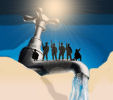 ALEPPO, SYRIA. 12 July 2015: The water crisis is getting bigger. We are boiling water and cooling it to make it clean to drink. A couple of days ago, the Syrian Government took over all water from the water sellers, who are blackmailing the people and asking expensive price for the water. Government and military officers distributed 500 litres per household for free. This pleased many but annoyed others who wanted more and were ready to pay for it. Yesterday's water prices doubled! Many say that the water (which comes from a dam on the Euphrates, which is under the terrorists' control) reached the Sleimaniyyé sector of the city, where the distribution station is located. So it needs couple of days to reach to our house.
ALEPPO, SYRIA. 12 July 2015: The water crisis is getting bigger. We are boiling water and cooling it to make it clean to drink. A couple of days ago, the Syrian Government took over all water from the water sellers, who are blackmailing the people and asking expensive price for the water. Government and military officers distributed 500 litres per household for free. This pleased many but annoyed others who wanted more and were ready to pay for it. Yesterday's water prices doubled! Many say that the water (which comes from a dam on the Euphrates, which is under the terrorists' control) reached the Sleimaniyyé sector of the city, where the distribution station is located. So it needs couple of days to reach to our house.
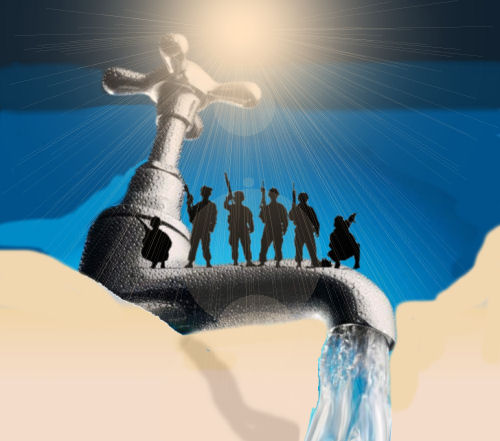 Water is life! Without it, we can't clean, drink, wash... Without it, everything is pale, dry, dusty, smelly, and thirsty.
Water is life! Without it, we can't clean, drink, wash... Without it, everything is pale, dry, dusty, smelly, and thirsty.
I cannot be sure of exactly what is happening in this water crisis, as I can only see part of the situation. My understanding is formed from what others tell me and other sources. I have observed military personnel requesting peoples' IDs, and filling blue forms to show which house has had its share and which hasn't. However some people claim that some pro-government officers took the water by force and allocated it to their own homes and those of their relatives and friends.
Anything is possible, but I didn't witness this and most of the taxi drivers I rode with over the last three days were happy with the government's solution and free distribution policy.
To put good policy or law into practice is another problem in Syria, because of the breakdown in organisation. I saw unruly crowds asking for their free share of water.
Rumour-mongers are par for the course, talking about people who tricked government officers to have double or triple the amount of free water, by using different friend's ID's pretending that they are neighbors. Again, everything is possible. In such a crazy crisis, there are no rules and ethics. Government, water sellers, and people. We can say that at least 20% of each group is deceptive and corrupt. As we know, negative humans don't notice the good 80% among the people or government, but they keep complaining about the corrupted ones.
Misusing water, from all sides, is another problem.
So as you see, it is hard to be completely optimistic about the situation. There is much confusion and each person notices what s/he wants to see. People who mistrust the pro-government militias and government officers can't believe that they are really distributing water for free, but I personally saw and heard that in the last 3 days. Others don't trust ordinary people. But no-one trusts the water sellers!
The day after the last attack on 2nd and 3rd July, the terrorists (by whatever names they call themselves) occupied part of the Scientific Research Centre outside Aleppo, which is located on big piece of land and has several buildings. The important stuff in the Scientific Research Centre had been evacuated some time ago, early in the crisis. The centre had then been occupied by the Free Syrian Army for several months, until it was liberated by the Syrian Army. Now, since this last huge attack of 2nd and 3rd July, the terrorists managed to occupy part of it. Battles have been ongoing since then, but there has been no big news, and things have cooled down somewhat.
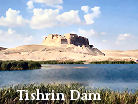 ALEPPO, SYRIA: We have received the following report, which attests to knowledge of ISIL using chlorine as a chemical weapon and controlling water supply from the Tishrin Dam on the Euphrates.
ALEPPO, SYRIA: We have received the following report, which attests to knowledge of ISIL using chlorine as a chemical weapon and controlling water supply from the Tishrin Dam on the Euphrates.
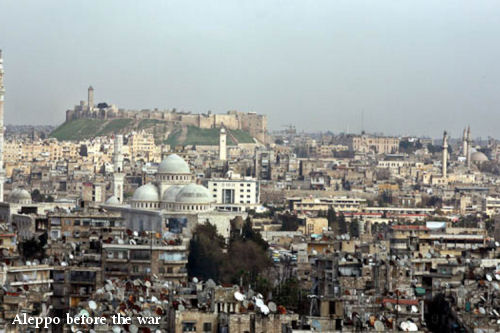
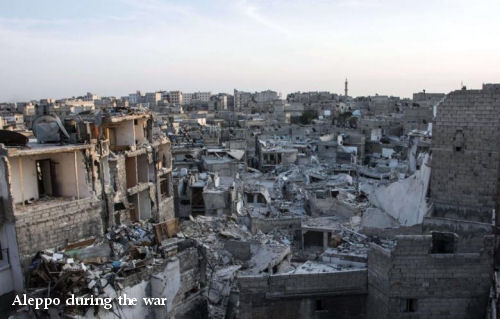
ALEPPO: We have water today, after 10-14 days without water service from the government. We spent all the day filling up all empty containers and bottles, the bathtub and water tanks and cisterns at home and on the roof. We filled up some of them few days ago, via the water seller. Aleppo 's water is from the Euphrates. Turkey used to prevent us from accessing water in the 1990's. ISIL is controlling the dam today and most of the Euphrates. They occupied the chlorine factory as well, which used to sterilize the water. Now ISIL is using it in chemical attacks, and the UN is blaming the Syrian army and government, either for claiming using it against innocent people, or for failing in protecting it from falling in the wrong hands of ISIS! Thanks to them, Aleppo is thirsty.
Forty year old neighbors have become like enemies. When you have limited time to have limited resources, people in the west turn nuts and do crazy stuff, run over each other, swear and hit each other while fighting over a digital camera or any other item. Same over here, fighting over little water.
Water is coming little by little, with some dust and clay at the beginning. It doesn't reach the higher stories of houses in the easy way of the old days. We need like a private pump to each house to do the job. But that needs power, and power/hydro/electricity comes around 4 hours a day.
People are depending on alternative solutions, like a small size generator that works on fuel. But fuel has become a problem of its own during the last couple of years, since there was no fuel in the city!
The other solution is to register with a bigger generator size for the neighborhood, with one's request of Amperes. We are registered for 6 Amperes, enough for the fridges, tv, fans, and lights. A dentist friend needs 16 Amperes for his clinic. That service gives us another 10-11 hours of power a day, and costs around $20 a week. We still have to suffer 9 hours without power.
So, back to the water conflicts between neighbors, each claiming that the others took more. I don't blame my mother or neighbors who are ready to start a conflict because of that, but I feel so bad at how sanctions, battles and agreements on the global level, have reached us as individuals and cause troubles between friends, families, and neighbors, who only a few years ago were laughing and inviting each other to share plenty of food...and water!
 The plain truth:
The plain truth:
- 10,000 years ago humans and our livestock occupied just 0.01% of all the land-air vertebrate biomass on earth.
- Now humans and our livestock occupy 97% of all land-air vertebrate biomass.
- Humans and our livestock now consume over 40% of earth’s annual green land biomass production.
- 1 million people born every 4½ days. People live longer.
 What does this mean?
What does this mean?
- 50% of All Vertebrate Species will be gone by 2040.
There is no embed function for the following film, but it is very worth looking at:
What have we done?
- 90% of Big Ocean Fish gone since 1950.
- 50% of Great Barrier Reef gone since 1985.
- 50% of Fresh Water Fish gone since 1987.
- 30% of Marine Birds gone since 1995.
- 28% of Land Animals gone since 1970.
- 28% of All Marine Animals gone since 1970.
- 50% of Human Sperm Counts gone since 1950.
- 90% of Lions gone since 1993.
- 90% of Monarch Butterflies gone since 1995.
- 93 Elephants killed every single day.
- 2-3 Rhinos killed every single day.
- Bees die from malnutrition lacking bio-diverse pollen sources.
- Extinctions are 1000 times faster than normal.
What’s going to happen to us?
- Ocean acidification doubles by 2050.
- Ocean acidification triples by 2100.
- We are on track in just 13 years to lock in a near term 6°C earth temp rise.
- Mass Extinction will become unstoppable and irreversible in 40 years.
- Permian mass extinction of 95% of life took 60,000 years 250 million years ago.
- Dinosaurs mass extinction took 33,000 years after asteroid impact.
- Anthropogenic mass extinction will take 300 years max.
- This mass extinction is 100x faster than anything before us.
- Antarctic meltdown now irreversible and unstoppable.
- Arctic methane burst is irreversible and unstoppable within current system.
- It takes 10 times as much rated “green” energy to displace 1 unit of fossil energy.
- Efficiency and conservation only causes more growth within our current system.
World Bank says we have 5-10 years before we all fight for food and water.
What we are doing right now!
- We combine bacteria DNA with plant DNA and eat it.
- We are eating stuff that never, ever existed on earth before.
- We put man-made, computer designed, synthetic DNA into our food.
- We put nano metals and nano particles into our food.
- We put poisonous pesticides and herbicides directly into food cells.
- There are thousands of different chemicals in our foods.
- We are turning into genetic mutants because of our food.
- We are wiping out all life on earth because of our food.
- After mass extinction, genetically modified trees may be all we leave behind.
Our “green” energy hi-tech future requires:
- conflict minerals,
- rare earth elements,
- heavy metals,
- nano metals and graphite.
Search for “rare earth mining in China” on YouTube and see what special hell your solar panels and wind turbines produce in Mongolia. China can do this because they have undercut all the world’s production of Rare Earth Elements (REEs) with low wages, low currency and no environmental enforcement. They can do this because they ignore the radioactive thorium that comes with mining high-value, heavy rare earth elements. Rare earth elements can’t profitably be mined outside of China without using radioactive thorium, the mining by-product found with heavy rare earth elements. We can’t afford to mine REEs while treating thorium as radioactive waste instead of as a profitable energy source. Burning thorium will pay for heavy REEs and provide the low-carbon base power “green” energy requires.
Graphite is used in all of our so-called “green” powered batteries and is mined in China emitting deadly fine air particles resulting in a lethal smog that washes down from the skies in an ash laden rain that covers crops and water. China recently shut down several graphite mines because of the pervasive smog. Graphene, a nano-material produced for batteries, is water soluble and can cut through human/animal cells. Both graphite dust and graphene are deadly to humans because of their small size. You don’t want to breathe this stuff.
"The Catch22 of Energy Storage" (Energy Collective article)
Solar cell manufacturing produces 3 green house gases that are over 10,000 times worse than C02. They require all kinds of deadly liquid acids to manufacture. Solar panels lose efficiency at the rate of 1% per year lasting 20-25 years. The expensive inverters they require have to be replaced every 5 to 10 years up to 4 times over the life of the panel. The new thin cell panels use nano materials and are even more toxic with shorter lifespans. It doesn’t matter how “clean” the latest experimental solar panels are because existing manufacturing plants will stay open to recoup major investments. Manufacturing just five wind turbines produces 1 ton of radioactive residue and 75 tons of toxic, acidic water used to leach out the required neodymium. Wind turbines only work at 25% of their rated capacity 90% of the time. Over 2 million children died in the Congo for the conflict minerals green energy needs. Thousands of people die in Chinese mines every year for the minerals green energy needs. Prof. Jian Shuisheng of the Jiatong-University estimates the production of just 6 solar panels requires one ton of coal. Since green power is intermittent, it would take at least 10 times the rated amount of “green” energy to displace just one equivalent unit of 24/7 fossil energy because your so-called 100 Watt solar panel delivers zero Watts at night and batteries are heavy toxic $energy hogs. One company in the U.S. cut down 5 acres of trees to build a solar farm to power a plant for the production of plastic bags. Green power will not be enough. Part-time energy and billions of batteries adds up to death to all life on earth just from destructive ecological inertia.
Ozzie Zehner explains “Green Illusions” in a series called, "Talks at Google":
Tim Garrett explains why in a three-part lecture:
- one dollar equals 10 milliwatts
- why we can’t decouple growth from emissions.
- why efficiency & conservation leads to more energy growth.
Did you know that the new $2 billion Ivanpah solar plant in the Mojave desert is a death ray that ignites birds in mid flight? When their bodies fall to the ground, they leave smoky trails in the sky called streamers. These birds are attracted to the bugs who are attracted to the shiny, pretty lights, just like us. It is estimated as many as 30,000 birds per year will die this way during huge migrations at just this one green power plant. Bigger solar plants of the same type are in the works including one near Joshua Tree, next to a wildlife sanctuary. During Ivanpah’s construction, up to 3,000 endangered desert tortoises suffered a temporary loss of legal protection and were allowed to be killed by heavy diesel equipment and materials. Thousands of slave workers die in China’s mines every single year to help produce the exotic minerals used in its construction. This is referred to as the “Green Economy”. If we changed the whole planet to green power, we would kill the earth we call home.
Civilization is slowly collapsing while the earth is quickly dying. My credentials? I cut grass in a trailer park in Canada.
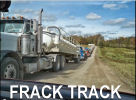 This song contains photos from protests in multiple US states as well as some from Europe. The footage is very impressive. Music is a great way to communicate, so send this round if you want to help resist the technology that is fracking democracy as well as razing entire landscapes. Fracking costs more than it is worth in terms of production as well, according to Bloomberg. See inside.
This song contains photos from protests in multiple US states as well as some from Europe. The footage is very impressive. Music is a great way to communicate, so send this round if you want to help resist the technology that is fracking democracy as well as razing entire landscapes. Fracking costs more than it is worth in terms of production as well, according to Bloomberg. See inside.
On 25 October 2013 in "EIA should provide data on cost of North American shale gas exploitation to make balanced reports," I asked EIA spokesman, Dr Fawsi, to tell me what the cost of production in fracking was. He said the EIA had the information but would not release it. However Bloomberg obtained the relevant information and published it in February under the headline: Bloomberg"Dream of US Oil independence slams against shale costs."
"Just a few of the roadblocks: Independent producers will spend $1.50 drilling this year for every dollar they get back." And, "Shale output drops faster than production from conventional methods. It will take 2,500 new wells a year just to sustain output of 1 million barrels a day in North Dakota's Bakken shale, according to the Paris-based International Energy Agency. Iraq could do the same with 60."
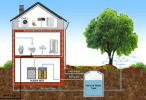 This research is significant for Australians who, with government engineered population growth causing rising water costs, are attempting to recycle water in many ways. "Researchers have identified that the use of wastewater to irrigate vegetable crops, which is common across developing countries, may significantly contribute to deadly health risks such as rotavirus, a major cause of diarrhoeal diseases." (Report from Melbourne School of Land and Environment)
This research is significant for Australians who, with government engineered population growth causing rising water costs, are attempting to recycle water in many ways. "Researchers have identified that the use of wastewater to irrigate vegetable crops, which is common across developing countries, may significantly contribute to deadly health risks such as rotavirus, a major cause of diarrhoeal diseases." (Report from Melbourne School of Land and Environment)
The research, published in the journal Risk Analysis today, which focused on the Beijing region, found that the risk posed to children eating vegetables grown with wastewater far exceeded the World Health Organization (WHO) acceptable level.
Diarrhoeal disease is the second leading cause of death globally. More than 99 percent of deaths of diarrhoeal disease occur in developing countries and 90 percent of these are in children under five.
University of Melbourne researcher, Dr Andrew Hamilton from the Melbourne School of Land and Environment said,
“This research shows that the use of wastewater in irrigation is a global critical health issue for the Asia Pacific region and beyond.”
“There can be lots of microorganisms that cause disease in wastewater. They can be transferred from infected people, travel through the sewerage system, and then be eaten from the vegetables. This is a dangerous cycle.”
The research found that some vegetables posed greater risk than others. “This was due to leaf shape, which affects the amount of wastewater and contaminants that are retained. Choy sum poses the greatest risk, while bok choy poses the least risk,” said Dr Hamilton.
“There is more wastewater irrigation in China than in the rest of the world combined. Much of this is used growing vegetables.”
The report recommended that China develop its own guidelines for wastewater use.
Dr Hamilton explained that similar situations exist across Asia and other developing countries, and this is where the risk posed by diarrhoeal diseases is highest.
“Vaccination programs for rotavirus are being rolled out globally, but at this stage, they are far from reaching all children in developing countries.
“When vaccinations cannot be relied upon to stop the spread of rotavirus and other diarroeal diseases, research like this is very important to identify other contributing causes.”

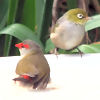
International Biodiversity Day May 22
Humans are appropriating too much water for their own needs and not leaving enough for the survival of other species, according to Sustainable Population Australia (SPA).
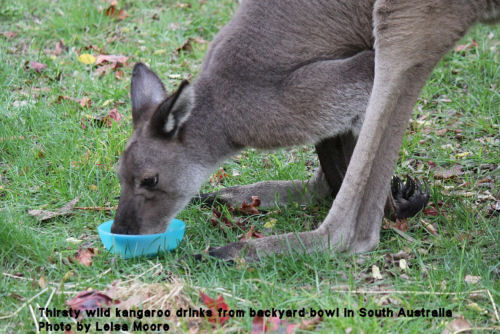 SPA National President, Ms Jenny Goldie, says that water is essential for all life, not just for humans.
SPA National President, Ms Jenny Goldie, says that water is essential for all life, not just for humans.
“The more water that is taken from rivers and aquifers to supply humans for domestic use, industry and agriculture, the less there is for the myriad of other organisms,” says Ms Goldie.
“Habitat loss or fragmentation, introduced exotic species and diseases, overfishing, and deterioration of aquatic environments due to eutrophication are all threats to inland aquatic biodiversity,” says Ms Goldie.
“Both the world and Australia are suffering a biodiversity crisis. In New South Wales, for instance, the Macquarie Perch, once widespread throughout Australian rivers, has disappeared from the Lachlan River except in one tributary. In a few short years the introduced species, Red Fin, has annihilated not only the perch but possibly also the Yellow Spotted Bell Frog.
“Climate change – an outcome of human activities - is an additional threat to Australia’s biodiversity. Large parts of the country will be desertified while other parts subject to extreme flooding. The effect on biodiversity is likely to be dire,” says Ms Goldie.
There are 7.1 billion humans on the Earth and it is likely there will be at least another two billion mid-century, mostly in developing countries, many of which are already experiencing water stress (when annual water supplies fall below 1,700 cubic metres per person) or scarcity (when annual water supplies fall below 1,000 cubic metres per person). All Arab countries are deemed water scarce; likewise 300 million people living in Sub-Saharan Africa.
“As still expanding populations take whatever water is available to grow food, other species will suffer. In parts of China, for instance, excessive pumping of groundwater for agriculture has caused trees to die, taking associated fauna with them.”
Ms Goldie says that for the sake of biodiversity, population growth must end.
A study published by McGill University in Montreal and Utrecht University in the Netherlands, analyzed data from global ground water use against computer generated models of underwater aquifers and concluded that the "groundwater footprint" of reliable resources above ground is 3.5 times larger than
the known aquifers.
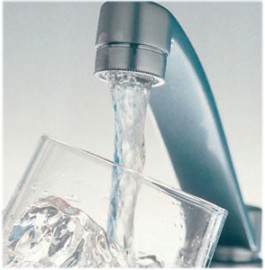
UNESCO's Intergovernmental Council of the International Hydrological Program (HIP) estimates that there is 366 million, trillion gallon of water on Earth.
The IPCC document HS 15332 Climate Change Impacts: Securitization of Water, Food, Soil, Health, Energy and Migration explains how the UN plans to secure resources to use at their disposal. Through the International Monetary Fund (IMF) under-developed countries are forced to sell their resources to the global Elite as "full cost recovery" to the global central bankers. Once those resources are under the complete control of the creditors, they become assets to be reallocated back to the enslaved nations for a price.
This scheme makes water sources under central privatization cost more and become less accessible to those who desperately need it. Water prices rise while the quality of it diminishes. This forces people in places like South Africa and India to collect water from polluted streams and rivers, which compromises their health. The cycle in complete when those who had their water stolen from them through coercion die from contaminated water that they were forced to use.
With over-population factored into the algorithms, underground water reserves and their native ecosystems are under the growing threat of human necessity.
Geophysicists at the Potsdam Institute for Climate Impact Research states that only 282 billion people could be "packed onto the planet". With the current number at nearly 7 billion, alarmists are pointing out that water will become a highly sought after commodity.
As exampled in South-east Asia, because of the 1.7 billion people using water reserves, the "sobering" fact concluded is that people are over-using groundwater in regions like Asia and North America.
With proper management, Tom Gleeson, lead researcher from McGill University, believes that underground water sources that make up 99% of the world's fresh and unfrozen water will become crucial to the growing human population.
The UN Environmental Program (UNEP) in a UN-Water Survey of 130 Countries Status Report has forced reformation through international water laws that apply pressure under the guise of "expanding populations, urbanization and climate change". While clean drinking water for humans is controlled, improvements designed to ensure freshwater reserves for the ecosystem are first and foremost.
Management and use of water under the international agreement known as Integrated Water Resources Management (IWRM) was back at the 1992 UN Conference on Sustainable Development. This is a part of the Agenda 21 plan. Cooperation of the UNEP and the UN-Water, an inter-agency mechanism to control freshwater resources, relates UN policies to governments on how to allocate their assets.
In Asia and North America, where researchers conclude that water resources are being allocated wastefully, agriculture is being attacked because of its use of water for irrigation. Gleeson says: "The relatively few aquifers that are being heavily exploited are unfortunately critical to agriculture in a number of different countries. So even though the number is relatively small, these are critical resources that need better management."
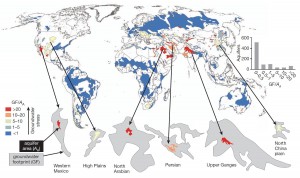 Gleeson claims that agriculture's effect on "the supply of available water" has not had a quantifying measure until his study to show "the impact of such agricultural groundwater use in any consistent, global way."
Gleeson claims that agriculture's effect on "the supply of available water" has not had a quantifying measure until his study to show "the impact of such agricultural groundwater use in any consistent, global way."
By mandating international restriction on water extraction combined with the promotion of meat-less diets, Gleeson asserts that water resources could be shared more sustainably.
The British Geological Survey and the University College London have surveyed African underground aquifers and concluded that there are more than 100 times the amount of water found underground than on the surface of the continent.
Andrew Mitchell, the United Kingdom's Secretary of State for International Development is delighted by this find. "This is an important discovery. This research, which the British Government has funded, could have a profound effect on some of the world's poorest people."
This discovery could become the largest attempt at water privatization. Water resources worldwide have succumbed to privatization, turning life's most essential molecule into a global commodity.
In North Africa, uncontrolled plans to extract underground water resources have been deemed unsustainable by the UN.
In disbursement of water resources, while trying to mitigate waste , the use of sewage effluent and other wastewater could preserve wildlife, rivers and ecosystems that are being destroyed by human necessity, in a new study. Stanley Grant, lead author of the study and a UC Irvine civil & environmental engineering professor, states: "This is the only path forward to provide water for humans as well as for ecosystems. We need to focus on improving the productivity and value of existing supplies, which basically means getting more out of a glass of water."
Water shortages could be rescinded by creating drinking water from wastewater while reducing the total waste from compromised piping in private-owned homes. How water is priced and managed must be reworked to make the most of "scare freshwater resources" say the researchers.
The securitization of water is a conflict of control over society and the right to life. It is a non-negotiable aspect of life on Earth. The false flag threat of water pollution (which is being committed by the global Elite through multi-national corporations) is a cover story for the march toward complete control over all basic necessities required to live.
Pursuit of water security means whoever has the water, choses who lives – and who dies. With the emergence of water regimes, land grabs where known aquifers reside underground make sense. Workshops designed to recruit more alarmists are popping up all over the academic world as the global elites seek to convince as many scholars as possible that the UN would be the best and only chance at fair allocation of our water resources.
Simply put, the "securitization" of water on a global scale (if the economic elites get their way) will be run by the UN only. Their target recommendations will then be directed to individual governments to be made into laws. The citizens of those nations will have no choice but to follow the laws of their countries; if they are to get their ration of life-giving water.
Susanne Posel is a frequent contributor to Global Research. Global Research Articles by Susanne Posel
See also: Does Australia need a national policy to preserve agricultural land? of 1 June 2012, Writer sees Bob Hawke as guilty of treason and treachery of 1 June 2012, WA Independent opposes foreign buyout of Australian rural land of 4 June 2012 -- article and comments on the same page.
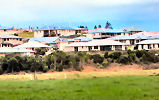 An Australian Farm Institute study provides a comprehensive review of what is currently known about the amount and location of Australian agricultural land, the rate of land use change occurring, and how governments make decisions both in Australia and internationally. Whether or not there will be sufficient good quality land available for agriculture in the future has not been a high priority issue for most of the past two hundred years.
An Australian Farm Institute study provides a comprehensive review of what is currently known about the amount and location of Australian agricultural land, the rate of land use change occurring, and how governments make decisions both in Australia and internationally. Whether or not there will be sufficient good quality land available for agriculture in the future has not been a high priority issue for most of the past two hundred years.
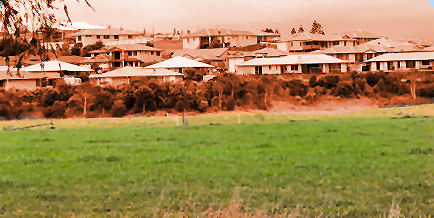
Obviously we do! This is a question being asked by the Australian Farm Institute
The rate of land use is changing, and it's important how governments make decisions both in Australia and internationally. Australia has the sixth largest land area and the lowest population density of almost any nation on earth, so the question of whether or not there will be sufficient good quality land available for agriculture in the future has not been a high priority issue for most of the past two hundred years. It's assumed that land is an infinite resource.
Our large land mass gives false sense of security, but Australia has only a little more than 6% arable land, irregular water supplies, and Australia features 96 percent desert. It lacks regular water, fertile soils and resources to carry its current population load. Yet, politicians remain bent on adding millions more people to Australia.
Obviously property development is more lucrative than horticulture, and their lobbyists are far more cash-up and powerful. Food security is not high on politicians' priority list.
According to the research report, Australia is being too reckless with its best agricultural land, and future generations might regret decisions that are currently being made about the future use of that land. With urban sprawl, mining, CSG and environmental demands taking more and more land, and foreign investors also purchasing significant areas, it is legitimate to ask whether Australia can realistically plan to become the future "food bowl of Asia". It's also legitimate to ask if our government's drive for perpetual economic growth be justified if it means we pay higher prices for imported food, something that may diminish in future years with global population reaches 9 billion.
While Australia appears to have plenty of land, in reality only about 3% is actually suitable for cropping, and even less of this is considered to be prime agricultural land. Low or high Population density and population size can't be compared to the nations in Europe of Asia with fertile soils, high rainfall and high human "carrying capacity".
The report concludes that Australia currently lacks a consistent and comprehensive understanding of where this land is located, or how much of it is being diverted from agriculture each year.
Australia is now a net importer of horticultural products, whereas it was a net exporter only a few years ago. Wheat, dairy, fishing and sugar production are all down from their previous peaks.
Earlier detailed research by researcher Dr McGovern, lecturer in the Queensland University of Technology’s school of economics and finance, found that Australia exports only around 25 per cent of its agricultural product at second-stage production, not 80 per cent as has often been supposed.
There's a great international market opportunity for a four-fold increase in food production in Australia, but there's no explanation on just this magnificent feat is going to be achieved, especially if climate change scientists are correct. A free-market economy has no parameters for the limitations of Nature, and that the security of domestic food supplies must be a priority over exports.
Once high immigration - the driver of our population growth - created jobs and an economy of scale, now our population growth is threatening our local fresh food supplies, and it must be slashed. We can't rely on imported food as global overpopulation will mean countries will need the food for their own populations. Food is more important than a "healthy" GDP!
Property development and real estate is obviously more lucrative than growing vegetables. It's about short-term profits and cash flows than real planning. What's the use of economic growth - a pseudonym now for population growth - without food security?
We must stabilize our numbers or we will be no better off than bacteria in a petri dish, bemoaning the lack of room for growth, knowing our final demise but being trapped by a leadership vacuum on population and its implications for food security.
The remarks made by prominent Australian businessman and environmentalist, Dick Smith that in 100 years time people in Australia will be starving to death is not implausible.
Minister for Sustainable Population Tony Burke remains silent, while our growth-based economy continues unfettered. . It's a number-free ministerial policy.
See also: The Groundwater Footprint: The Privatisation of the World's Water Resources of 16 August 2012.
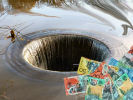 The period since the Murray-Darling Basin Authority released its guide to the proposed plan, nearly two years ago, has been marked by sustained outrage from all quarters.
The period since the Murray-Darling Basin Authority released its guide to the proposed plan, nearly two years ago, has been marked by sustained outrage from all quarters.
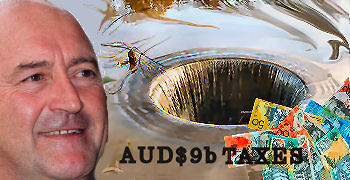
The ongoing flooding in the Murray-Darling Basin, coming so soon after the decade-long 'Millennium Drought', is a stark reminder of the extreme variability of the Murray-Darling river system.
These events also illustrate why the proposed Basin Plan, predicated on allocating a fixed volume of water for irrigation and returning a fixed volume of water to the rivers, has been widely condemned as facile and insincere, and of failing to improve on the existing, discredited management regime.
The period since the Murray-Darling Basin Authority released its guide to the proposed plan, nearly two years ago, has been marked by sustained outrage from all quarters. The authority, under its current chair, political apparatchik Craig Knowles, has been accused of a lack of transparency and of scientific dishonesty.
Few if any stakeholder groups have willingly embraced the proposed Basin Plan, and those that have indicated that they may are tending to do so in the belief, as stated by Craig Knowles himself, that his plan is "better than no plan at all" ? hardly a ringing self-endorsement of a proposal which will direct the expenditure of over $9 billion of taxpayers funds.
It appears that both Mr Knowles and federal Water Minister Tony Burke have adjudged the proposed plan to be worthy precisely because it pleases no-one.
In the broader community, there is widespread frustration and "Basin Plan fatigue" as criticisms and counter-criticisms continue to saturate the debate and consensus seems hopelessly unattainable.
Many are now asking: as a nation, how have we arrived at this impasse?
ACCESS COMPLETE ARTICLE AT: http://www.fairwateruse.com.au/content/blogcategory/14/47/
 Aussies take action! Lock the gate!" Australians to gather in Brisbane to defend water and land from coal and coal-seam gas fracking, which has already been totally banned in France. (See comments.) On Sunday October 16, 11a.m. Queens Park Cnr George & Elizabeth Sts. Brisbane City. lockthegateqld[AT]gmail.com Facebook: Defend Our Water Qld Tel. 0404 677 781 www.lockthegate.org.au
Aussies take action! Lock the gate!" Australians to gather in Brisbane to defend water and land from coal and coal-seam gas fracking, which has already been totally banned in France. (See comments.) On Sunday October 16, 11a.m. Queens Park Cnr George & Elizabeth Sts. Brisbane City. lockthegateqld[AT]gmail.com Facebook: Defend Our Water Qld Tel. 0404 677 781 www.lockthegate.org.au
For more information about gas-fracking, see "Fracking democracy - Gaslands- the movie, the industry and national responses." France completely banned all fracking a few months ago and last week it revoked licences given to some companies which tried to demonstrate a new, safer method. The French Government said that there is no safe method of fracking. It is environmentally destructive, socially destructive and dangerous to water catchments.
Aussies take action! Lock the gate! Defend our water from coal and coal seam gas!
Coal Seam Gas and Coal represent the biggest threat to our precious underground water reserves in our history. On Sunday October 16, join with communities across the country to demand a moratorium until the full social and environmental impacts are known. Gather 11a.m. Queens Park, Cnr George & Elizabeth Sts., Brisbane City. 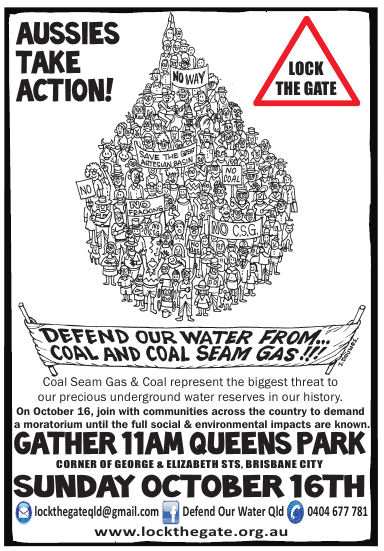
E-mail lockthegateqld[AT]gmail.com
Facebook: Defend Our Water Qld,
Tel. 0404 677 781
www.lockthegate.org.au
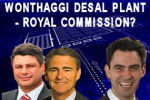 Andrew Chapman is calling for a Royal Commission into the Victorian (Wonthaggi) Desalination Plant. We publish here his comments and some early discussion. We also publish some correspondence with Tim Holding, the Minister for Water under the Brumby government. There seems to be wide support for a royal commission into the matter, which is perceived widely as corrupt. The matter of desalination plants is a huge one in Australia where such plants, not necessary when we had a population of 17m only a decade ago, have been introduced in nearly every state with the excuse that our growing population requires them. The public have not been adequately consulted on the population growth induced by ill-considered government policy nor on the introduction of these plants themselves. What is for sure is that almost no-one likes these plants and governments are bitterly resented for having forced them on Australians. (More about Wonthaggi Desal plant here.)
Andrew Chapman is calling for a Royal Commission into the Victorian (Wonthaggi) Desalination Plant. We publish here his comments and some early discussion. We also publish some correspondence with Tim Holding, the Minister for Water under the Brumby government. There seems to be wide support for a royal commission into the matter, which is perceived widely as corrupt. The matter of desalination plants is a huge one in Australia where such plants, not necessary when we had a population of 17m only a decade ago, have been introduced in nearly every state with the excuse that our growing population requires them. The public have not been adequately consulted on the population growth induced by ill-considered government policy nor on the introduction of these plants themselves. What is for sure is that almost no-one likes these plants and governments are bitterly resented for having forced them on Australians. (More about Wonthaggi Desal plant here.)
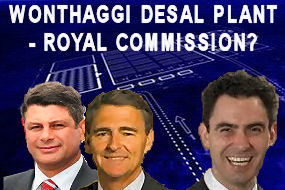
The Bracks Government won its last election on a policy of opposing a desalination plant to augment Melbourne's water supply. When Ted Baillieu suggested a small desalination plant the Bracks team ridiculed that suggestion but on election Bracks reneged on its election policy and approved the construction of a large scale desalination plant at Wonthaggi.
Times moved on and water storages are now either full or filling rapidly with Melbourne's storages set to reach 60% capacity in the next two or three weeks. Melbourne's water storages have not increased because of the desalination plant, it is a long way from being finished, but because weather cycles moved from drought to floods, something which civil engineers consider when planning water supplies. Taxpayers and consumers are to pay for this very expensive water supply option regardless of whether or not it is needed. The desalination plant will require large amounts of electrical power to operate. Perhaps if the Bracks and Brumby governments pursued water conservation and recycling this huge cost burden would have been avoided.
Whilst the government held a particular view it is clear the planning process did not adequately consider alternative options or submissions presented to the EES that, with evidence, argued that the desalination plant should not be pursued. Many people will remember how the planning process operated right down to the government authorising police files on objectors being handed over to the contractor.
Melbourne's water storages are now at 58.3% (still plenty of wet weather to come), same time last year 35.0% and the year before 26.8%.
The government did not have a mandate for the desalination plant and the planning system has failed Victorians resulting in huge water debts to be met through the purchase of water that is not needed. This is not a small project with a capital cost originally estimated to be no greater than $3.1 but more recent estimates at $5.7b and suggestions that it may be more like $7b when finished.
There are three appendixes below: Appendix A, "Communications with Tim Holding," and Appendix B, "Comments about a Royal Commission from a circular back in March of this year." Appendix C contains some media coverage.
If a Royal commission is to get up and running it will only do so with widespread public support. If you could pass your comments on to Andrew Chapman or post them as comments here on candobetter, we can also work towards canvassing the mainstream media. When the storages hit 60% capacity, the time will be appropriate to launch a major campaign.
So, Royal Commission into the Desal Plant - What do the people think?
CONTACTContact by email Andrew Chapman or telephone 56741266 or 0438567412
__________________________________________________________________________
As at 19/7/11 there has been no response from Tim Holding.
-------------------------------
14/7/11
Re: Catchment Rainfall and Runoff Forecasts for Melbourne's Dams
Dear Tim,
Perhaps you could confirm whether such information exists?
Regards
Andrew Chapman
-----------------------------------
13/7/11
Re: Catchment Rainfall and Runoff Forecasts for Melbournes Dams
Dear Andrew
Thank you for your email.
As I am no longer the Victorian Water Minister it would be more appropriate for you to direct your request to the Department of Sustainability and Environment.
FOI Unit
Department of Sustainability and Environment
PO Box 500
EAST MELBOURNE VIC 8002
Yours sincerely
Tim Holding
-----------------------------------------
13/7/11
Catchment Rainfall and Runoff Forecasts for Melbourne's Dams
Tim Holding MP
Dear Mr Holding
Catchment Rainfall and Runoff Forecasts
The adoption by the Bracks/Brumby governments of a desalination plant at Wonthaggi to supply water to Melbourne was no doubt based on that government's perceived need for additional water.
When Melbourne's water storages fell to low levels I expect that you, as Water Minister, would have sought expert advice on the long term rainfall and runoff for the catchments supplying the storage dams.
Could you please provide me with, or direct me to where I would find, copies of all the reports and advice provided to you on the catchment rainfall and runoff?
Regards
Andrew Chapman
__________________________________________________________________________
As at 19/7/11 there has been no response from Tim Holding.
------------------------------------
3/3/11
Royal Commission into Desal Project
Timothy Holding MP,
Dear Mr Holding,
It appears from your comments in the media that you think the desalination plant, originally estimated at no more than $3.1b and now at considerably more, is good value for Victorian taxpayers and consumers. If you think the cost, social and environmental impacts are justifiable then I imagine you will be happy to support a community move to establish a Royal Commission into the planning and approval process for the project.
It could deal with, but not be limited to, the Bracks/Brumby government's involvement in the process, the role of Ministers and party advisers who worked in the public service, any influence they may have had on process, whether or not the evidence produced for the EES was appropriate or balanced and how the process considered submissions by the public.
The answers to these matters may be readily available and if a Royal Commission is implemented you and your fellow ex Ministers would no doubt have an opportunity to commission consultants and lawyers to present your case. It may determine that your decisions were soundly based but could also reveal an opportunity to abandon the project without cost to Victorians.
As you can appreciate people are shocked by the recent revelations that the cost of this project has escalated and that it may cost $23.5b by 2030.
I look forward to you and your fellow ex Ministers supporting a Royal Commission into the desalination plant approval process.
Regards
Andrew Chapman
-----------------------
________________________________________________________
Andrew Chapman distributed the following statement in an email. Below this statement are a number of very interesting comments from the public.
Andrew Chapman:
"Yes I do intend to go forward with the intention of getting a Royal Commission Inquiry into the desal plant approval process. It is our one and only big chance to expose the planning system for what it is and what occurred under the previous government. If we don't do something the bureaucrats will eventually persuade the new government to go down the same path on newer proposals. The reason I think we should have high expectations is that it affects so many people in a big way.
Remember when it was announced by Bracks and Thwaites on the same day people were told their properties would be taken, the legal costs awarded against campaigners when they were denied any opportunity to appeal against the decision, then when the government found they required an EES the way in which that was done and then handing over police files on objectors to the contractor.
Then there's the Banks. Westpac signed the Ecuador Principle and made it part of their advertising campaign and yet the way this project was handled was not much different to what happens in third world dictatorships.
All the time people argued that they were going down the wrong path but the Bracks/Brumby obsession could not be stopped.
I think as a starter we should be opening up discussion with as many people and groups as possible. If there are enough people interested in a Royal Commission we should then start to let the media know. We are all burdened with this social, economic and environmental disaster so people should feel free to add their bit in any way they feel they can contribute."
-------------------------------------------------------------------------------------
Thank you very much, Mary. I hoped you would forward it. You might also like to mention my blog http://reengineeringaustralia.wordpress.com. The model I refer to is simply a 1 sq. km grid laid over the entire country, where we use on-the-ground and satellite information to populate each element with relevant data. After that, you can apply all sorts of rules and computations to evaluate the usefulness or the sensitivity of that particular element for a particular usage (including “don’t you dare touch it”!).
Regards
Jim W
-------------------------------
Anything to make them accountable and process transparent is worth it!! This must be prevented if at all ever stopped? Id love to know why the contract cant be terminated?
Sheryl
-------------------------------
yes it does, but I fear the chances are small.
best regards Stephen C
-------------------------------
Of course it's corruption. But the reality of it is that our government is Big Business and our Parliament is powerless to stop us being sold into slavery. Most boiled frogs accept the propaganda that we live in a democracy and that our Parliament is Government.
Even if you do manage to get a Royal Commission, it's terms of reference will not be able to tackle the reasons for how such wholesale corruption could have taken place.
And don't get me started on Laws and the Justice system.
Ray
-------------------------------
I have had a career in civil/structural engineering, town planning and IT, but I simply cannot get my head around what professional, accounting and ethical processes could possibly justify the Wonthaggi desalination plant. I had an exchange of emails with Rosemary West about my blog on sustainable population and I quoted the desalination plant as an example of where the land usage model I proposed could be have been used in the design phase or, given the current catastrophe, to chart all of the problems needing attention. Here is what I said to Rosemary on this topic (with a little subsequent expansion):
Did the State Government investigate every possible site along the coast before selecting Wonthaggi ? If so, what were the criteria used and what were the scores of the various sites ?
If they did not do this, did they select the site for technical, financial, political or governmental reasons ? If so, what were those reasons ?
If they did not select the site, was it selected by the contractor ? If so, were a number of contractors approached to tender for the project ? If so, were they in agreement as to the suitability of the site? If not, did any of them suggest alternative sites ? What were the various contractors’ reasons for selecting any particular site ?
If only one contractor was approached to tender, what were the reasons for selecting that contractor ? If the contractor is a consortium, what due diligence was carried out to satisfy probity requirements ?
I have worked on road and rail projects in the UK, East Africa and Australia. I came to Australia to work on the WA Standard Gauge Railway in 1965, so I do have some idea of where the costs lie in constructing such projects. I have done a little research, looking at the costs/lane (roads) and costs/line (railways) in the 1960s. I projected these to the current time, in accordance with the fall in currency values. Broadly speaking, I believe that infrastructure projects today are mostly costing about double what one would expect. I think this is largely due to the finance models in use today and any investigation should include a discussion on the appropriateness of these for constructing infrastructure projects (as opposed to perhaps managing them afterwards.
Here are a few books which I think are required reading for anyone wishing to participate in this latter discussion:
“Pigs at the trough: lessons from Australia’s decade of corporate greed” by Adam Schwab.
“Zombie economics: how dead ideas still walk among us.” by John Quiggin.
“Our corrupt legal system: why everyone is a victim (except rich criminals)” by Evan Whitton. [Evan Whitton home-page (Ed.)]
This last is a little bit out of left field, but I think it is important because it describes the difficulties (and enormous cost) of the adversarial system used in anglophone countries. An important point is the way in information can be hidden or excluded from consideration by courts and inquiries.
I hope you (and perhaps others) find these remarks helpful in moving things along in this matter.
Regards,
Jim W
-------------------------------
1. The desal Royal Commission is essential for several reasons. Firstly, to extract accountability from the previous government, and, secondly, to limit the excesses of the current government.
2. Its not party political but necessary for restoration of public confidence in politics of all shades.
3. Given my druthers, I would like to see a Royal Commission into all Public Private Partnerships, over the last 30 years.
All strength to your arm,
Don K
-------------------------------
Yes, it is essential. Are there plans?
Your correspondent doesn't mention the funding scandals that implicated the Labor Party all the way to Queensland.
The whole thing was a total disaster and according to the Fin Review, Tuesday 3 March 2011, p. 7,
"Even if Victorians don't use a drop of water from the state's desalination plant, it will cost them more than $600 million a year for a quarter of a century, new documents show."
Sheila N
-------------------------------
I agree that how the DeSal project was handled was appalling….and it’s not the only one. Billions of taxpayers’ funds have been spent on projects that we in the community (those who finance these mega projects) neither want nor need.
DeSal, the NS pipeline and Channel Deepening all had its opponents spied on and well orchestrated campaigns to denigrate them whilst promoting the project as being the only alternative. That our elected representatives and we as a community have tolerated this lop sided “contest” for so long is a worry in itself.
And there’s little doubt there’s be more to come in future if we can’t change the way we do things. E.g. the reported $9.5 billion+ to do to Westernport what a handful of shippers and truckers want.
I keep coming back to my main themes:
· An extra 75,000 people per year into Melbourne and their housing, food and transport requirements can’t have any other outcome whilst ever we are on the “business as usual” trajectory. Population pressures (driven by those few faceless entities that benefit from population growth) are at the root of this endless expansion industry.
· Those vested interest groups and faceless entities have too great an influence on our elected representatives. They enjoy armchair rides through open doors to the offices and dining tables of those we elect – whilst the likes of you and I (and many other well meaning, well informed, well educated and altruistic persons) are left outside wringing our hands and waiting perhaps months for a 30 minute meeting with the Minister or more likely his lackey. Meanwhile the bulldozer flattens Westerfields or whatever other special place we are concerned about)
· Our present governance arrangements have allowed this inequitable access to influence to permeate how decisions are made, because:
· Those we elect once every 4 years are not legally obliged to do any of the things they led us to believe they were committed to during their election campaigns. Generally they have misled and disappointed us, and our only recourse at present is to wait another 4 years to elect the next lot who don’t have any legal obligations to abide by their undertakings either. Our influence - once every four years as we shuffle into the polling booth is perfunctory, indeed illusory.
Somehow or other we need to find a way to have more direct and regular input into the decisions made by our elected representatives – Direct democracy. Contentious issues and those where our local MP doesn’t have his/her own firm view, local polls could be held to guide the MP on how to vote in parliament. State-wide and national sissies could be resolved via referendum. It is working well elsewhere e.g. In Switzerland where voters not only elect the government, they also directly vote on policy issues and legislation passed by the parliament. So why not here?
A very interesting and relevant program on ABC RN Rear Vision recently on how such a system works in Switzerland is well worth reading/listening to. Here’s the link http://www.abc.net.au/rn/rearvision/stories/2010/3047700.htm
-------------------------------
So- If a Royal Commission’s Terms of Reference would address how we could better handle decision making processes on contentious and difficult environmental/social and economic issues like the ones we are so familiar with I’d be all for it.
Thanks for keeping us so well informed and in the loop Mary
Cheers
Jenny W
-------------------------------
I don't think there is any prospect of the current State government deciding on a Royal Commission into the project. The Desal was a decision of the then State government and we might not like the decision but I can't see what the grounds would be for establishing a RC. Bearing in mind too, that a Royal Commission would cost millions to conduct.
Regards, David.
Yes, yes, yes! I'm sure the Greens will support it as well. We knew at the time that if we put in the right conservation strategies, we could generate the same amount of water. This was publicised and ignored so that big corporations could get a Salary from the people of Victoria for life. If the Royal Commission would expose this travesty, let's support it 100%
Gillian C
-------------------------------
Happy to go ahead with asking for a royal commission.
June H
-------------------------------
I agree. Particularly I can not believe that the tax payers of this state are saddled with that massive bill AND the destruction of a lovely area. Talk about a lose/lose situation. I think the terms of the RC should investigate the possibility to minimize $ loss and not go ahead with any aspect of the wretched thing. Remember, the Greens were against it from the start, and the Green candidate for Bass was one of the leading anti-desal campaigners - Neil Rankine. He is a great resource and a fountain of knowledge on the issue.
Cheers
Wendy R
-------------------------------
The argument for a Royal Commission is overwhelming: How was the assessment made-comparing all alternatives? How was the size determined? Was the evaluation of this project fully integrated with other measures, in particular the N/S pipeline and water recycling plans? What was the process for evaluating the most suitable site? What was the basis for selecting the successful tenderer and awarding the contact? What were the true circumstances of commercial in confidence which prevented the Gov't from informing the public beforehand on these issues? What was the basis for electing the extortionist pay rates for this project and what were/are these and all the attendant site awards/provisions? What truth is there to suggestions that the unions involved are selling or seeking other benefits in exchange for the right for workers to work on this project? What was the Gov't policy for managing public opinion and how was this managed and controlled? How much attention did the Gov't give to seeking public opinion and to have genuine consultation with the communities affected? What was the quality of examination of the environmental impacts? What consultants were engaged for this purpose, how was this process handled and what were they paid? There are other issues as well, but surely this is more than enough!
Reg B
-
-------------------------------
You will recall that the EES process was totally flawed. Rather than it examining all alternatives (including the key one of doing nothing) it was
relegated to an examination of effects after the go ahead had been given.
Bracks in his helicopter said the decision had been made and now there could be an EES.
A Royal Commission could also look at the lack of flexibility (ie cancelling the project) caused by putting it into private hands.
Geoff M
-------------------------------
And when they dug up 5000 artifacts what happened to the 2007 legislation designed to conserve and protect aboriginal cultural history and heritage.?
Bev W
-------------------------------
I certainly wholeheartedly agree with your plan. You certainly have our support. Don't know if I mentioned to you also but I intend going to the Ombudsman to ask him to revisit the manner in which the Macarthur windfarm planning permit was amended in July 2010, with so many changes that it hardly resembles the original plan for which they were given approval in 2006. However that will take me a long time getting everything ready for my request and haven't found a moment yet !!!
Let me know if there's anything I can do to help you.
Annie G.
-------------------------------
Given Victorians are delivering $2m a day towards this project I think an investigation is more than warranted.
There should be an investigation into the role of the union super funds who invested in this lucrative gravy train. Were independent super funds, such as AMP or MLC or even self-managed super funds given an opportunity to weigh up the investment? I doubt it. I believe an investigation would show that the entire exercise has vastly enriched the CFMEU workers, to the competitive detriment of the entire Victorian construction industry, and enriched the super funds.
Are Bracks and Brumby now on the boards of any of those super funds?
I think this trend to enrich “ALP type” super funds will rapidly shift to Canberra and we are likely to see the bulk of rorting going through the Carbon Tax mechanism and particularly the $10bn Bob Brown Green Bank that will be used to prop up these investments.
Tim L
-------------------------------
Of course there needs to be an Royal Commission.
I presented at the Panel giving advice that the expert technological advice in particular about acid sulfate soil and its eventual disturbance, had been distorted and altered to present a picture of no harm will be done by this Desal excavation of this coastal soil..
Words such as probable were altered to unlikely or similar phrases' There were no recommendations about further testing to establish the extent of this Acid Sulfate Soil l which has a potential to destroy water fish and plants when it is exposed to oxygen and water is withdrawn and returned to the aquifer. I have a substantial submission in which I cited such watering down to the point of negligent culpability and lying.
I have been informed and some items in the local news have relayed that Acid Sulfate Soil had become a major problem.. I also believe the National Policies on disposal of this contaminated soil have been ignored. Mitigation with lime has not been used in appropriate amounts.
I spoke with the project Engineer at an open day earlier this year and he was totally ignorant of the type of soil he was digging up and or how it should be mitigated/managed.
I was enraged about the way I was treated at Panel Hearings in Pakenham when the Chairperson - a woman - was extremely rude to me. I believe discriminated against me because during my 10 minute presentation with power point and handouts which had been an effort of extreme intensity, she stated that I was "holding up lunch" for the panel.
I am am applied scientist and retired University Senior Lecturer . I have studied these soils for over 7 years and I was invited to (perhaps to dumb me down) to join the Government committee of the day. I felt patronised and realised that there was no intent to be sincere in this inquiry.
My colleagues in this protest campaign had undertaken to examine all 25 volumes of the Desal EES reports all agreed that the recommendations had been watered down on each and every occasion in the Executive Summary.
I would be happy to attend any Inquiry and make my outrage known.
Bev W
-------------------------------
TRANSCRIPTS FOLLOW:
Stateline, Age, ABC, Transcripts.
------------------------------------------------------------------------------------------------------------------------------------
ABC's Victorian Stateline Program of 31/7/09
TAMARA OUDYN, PRESENTER: The State Government announced this week who it’s chosen to build and operate Australia's largest desalination plant at Wonthaggi. It also revealed it’s agreed to act as a lender of last resort to sure up finance for the project, which will be a public/private partnership. Most of the detail, including financial aspects, hasn't been released. Water Minister Tim Holding wasn't available to speak to Stateline, but here’s some of what he had to say to Jon Faine on ABC Radio this morning.
JON FAINE, ABC RADIO PRESENTER: Why’s it being called a PPP if it’s underwritten by Treasury? It’s not really a PPP and wouldn't it really be cheaper and simpler to build it as state infrastructure?
TIM HOLDING, WATER MINISTER: Well it is a public-private partnership. And the question you’ve asked is: would it have been cheaper to build it as a public – provide it as public sector provided project. And as part of this project – or part of this process, we are required to establish a public sector comparator, which is a tool which tells us what it would have cost us to build this project if the public sector had assumed all of the risk and built the project itself. And the public sector comparator tells us that either of these bids - both the Aquasure bid, which is the bid the Government has accepted, as well as the Bass Water bid - were well below the public sector comparator. So that’s the guarantee that the public is getting value for money from the involvement of the private sector in the delivery of this project. ... There will be new renewable energy projects generated as a consequence of the ...
JON FAINE: Where?
TIM HOLDING: Well, of the – the consortium will make that clear through the purchase of their renewable energy.
JON FAINE: So you don’t know? You can't tell us?
TIM HOLDING: Well it will become clearer over time. They will also be purchasing renewable energy credits as part of the process. And that’s the public's guarantee that the power that’s used, the energy that’s used to power this plant has been offset by the purchase of not just renewable energy, but renewable energy in addition to the targets that the Government had already set.
JON FAINE: Can you guarantee that consumers' water bills will only increase by the stated 100 per cent over five years?
TIM HOLDING: We’ve said that over the next price period, bills will double, but not more than double. We reiterate and reaffirm that guarantee. The Essential Services Commission has reaffirmed that. In fact, the price increase will be a little bit less than that. And as I mentioned earlier by reference to the public sector comparator, that both bids came in below the public sector comparator, and that’s a guarantee also that the price impact of this project will not only be less than the full doubling of water prices, but in fact will be less than if the Government had been forced to deliver this project ourselves.
------------------------------
TAMARA OUDYN, PRESENTER: Tony Shepherd is the chairman of the consortium chosen to build the desalination plant. I spoke with him earlier.
Tony Shepherd, welcome to the program.
TONY SHEPHERD, CHAIRMAN, AQUASURE: Hi, Tamara. Nice to see you.
TAMARA OUDYN: How many desalination plants has your company been responsible for and why is this one different?
TONY SHEPHERD: The technology provided to our consortium is Degremont, a French company. Degremont has provided hundreds of desalination plants throughout the world. In fact I think it's the world's leading provider of desalination plants. They’ve done the plant recently in Perth, which is operating and operating very successfully. The difference in this one: I guess it's a modern plant, state-of-the-art, the design and integration into the local environment is different. And the fact that we have to build such a large plant in a very short time is also different.
TAMARA OUDYN: Finance has obviously been a key issue. Whose idea was it for the Government the lender of last resort?
TONY SHEPHERD: Well obviously with the GFC, raising all of this debt and equity was an issue for us. Having raised all of the debt, the banks were concerned about that part of the debt that they wished to syndicate, and we took that to the Government as a suggestion and the Government adopted it. We think it’s a smart way of getting around the issue. But we’re confident that the banks will in fact be able to syndicate that debt.
TAMARA OUDYN: It’s $4 billion worth. Is it true that you plan to offload most of that?
TONY SHEPHERD: No; I think it’s about $1.7 billion that has to be syndicated of that four.
TAMARA OUDYN: So when would you need to finalise your financial arrangements?
TONY SHEPHERD: By financial close, which is in about two months’ time.
TAMARA OUDYN: The price of the project is now being put at $3.5 billion. Will that be the total cost?
TONY SHEPHERD: That's the total cost of the construction of the plant. On top of that, we’ll have things like interest during construction and company costs.
TAMARA OUDYN: So what other sorts of costs are associated with completing the project that aren’t included in that figure?
TONY SHEPHERD: Well mainly interest during construction.
TAMARA OUDYN: And how much would you expect that to ... ?
TONY SHEPHERD: Well I think the total funding will be $4.8 billion, so the difference between the $3.5 and the $4.8 is associated with the financing of the project.
TAMARA OUDYN: Over and above the cost of building the project and getting it up and running, how much will it cost to run each year?
TONY SHEPHERD: I haven’t got the exact number at my fingertips, but it’s into the hundreds of millions a year, including the cost of power.
TAMARA OUDYN: You’ve struck a deal that allows the Government to order as much or as little water as it needs. How do you make a profit in that circumstance?
TONY SHEPHERD: Well, we get paid for having the capacity available. And obviously we get paid for actually producing the water. So, the Government has the flexibility as to how much water they want us to produce, but obviously we have to service our capital in the meantime and keep the plant in good operating condition and we get compensated for that.
TAMARA OUDYN: Are you free to take orders from other customers?
TONY SHEPHERD: No, no we’re not. We can only supply the Victorian Government.
TAMARA OUDYN: So how will you make a profit if we have a big downpour in Victoria and we’re set for water?
TONY SHEPHERD: Well, we certainly take some risks on that. But if you look at the state of the dams at the present time, at less than 30 per cent capacity, it’s highly unlikely that this desalination plant will not be running in a maximum condition for quite a while, in my view.
TAMARA OUDYN: Roughly how much will a megalitre of water cost?
TONY SHEPHERD: We can’t disclose that as yet. This will be disclosed after financial close, when our contract is published.
TAMARA OUDYN: Why can't you disclose that?
TONY SHEPHERD: Because the Government has asked us not to until the contract is disclosed to the public. The price is not exactly finalised until we reach financial close. There could be some slight variations in the meantime.
TAMARA OUDYN: And what’s the price dependent on?
TONY SHEPHERD: The things that might vary in the meantime is the rate of interest and things like that that might vary over this period of time, but relatively minor. We’re talking marginal changes. But the Government prefers to release the details of the contract in one go after financial close, and I think that’s sensible.
TAMARA OUDYN: It’s been reported that the desal plant will produce more than one million tonnes of greenhouse gases each year. Is that irrespective of how the power to run it is generated?
TONY SHEPHERD: That is a hypothetical figure that you’re discussing.
TAMARA OUDYN: More than one million tonnes?
TONY SHEPHERD: Yes, that’s just purely hypothetical. Because the energy that we use – the main energy we use in the plant to produce desalinated water is renewable energy, which, by definition, doesn’t produce carbon. I disagree with the number, yeah.
TAMARA OUDYN: So you can't tell me what the projected emissions would be because ... ?
TONY SHEPHERD: We will be carbon neutral. The plant will be carbon neutral.
TAMARA OUDYN: So what’s your time frame; when do you think you’ll be turning the taps on?
TONY SHEPHERD: December of 2011 is the target, is our contractual commitment, so, that’s a very tight schedule for a plant of this size.
TAMARA OUDYN: And will you be operating at capacity by that stage? Or will it be a gradual run-up to ... ?
TONY SHEPHERD: We’ll be getting close to capacity then.
TAMARA OUDYN: So when do you think you’ll hit capacity?
TONY SHEPHERD: We’re hoping to get it by then.
TAMARA OUDYN: Tony Shepherd, thanks for joining us.
TONY SHEPHERD: Thank you.
-------------------------------------------------------------------------------------------------------------------------------------
Victorians need evidence they’ll be desal winners - "The Age July 31, 2009"
THE deal is done. Premier John Brumby has announced that AquaSure, an international consortium consisting of Suez Environment, Degremont, Thiess and Macquarie Capital Group, will build Australia’s biggest desalination plant. The decision on the $3.5 billion project — $400 million more than the $3.1 billion price tag that the Government has long quoted — has put paid to suspicions that another French-led consortium might be in line for the contract to make up for Connex parent company Veolia and its potential merger partner, Yarra Trams parent company Transdev, losing their public transport contracts.
The project remains contentious in other ways, not least among local residents fearful of its impact on their environment. The higher cost only increases pressure on the Government to provide solid evidence for why it preferred the costly and environmentally dubious option of desalination — which it scorned before the 2006 election — over water recycling and stormwater capture.
The Government has been reluctant to release the public sector comparator of the costs of desalination and the greener alternatives. One suspects recycling costings have been inflated by provision for third-pipe infrastructure to keep a politically motivated promise not to use recycled water for drinking — an internationally tried and tested solution that really should be the basis for comparison. Instead, most of Melbourne’s treated waste water will still be pumped out to sea — a waste of roughly 200 billion litres a year.
Of course, the Government is talking up the project’s benefits, including jobs. An underground power supply allays one concern about impacts on the landscape and landowners. On the face of it, the commitment to use renewable energy is welcome, given justifiable community concern about the wisdom of using a power-hungry, greenhouse-gas-producing plant to make up for the scarcity of water in an environment of climate change. Water Minister Tim Holding said Aquasure would build, with AGL, a 63-megawatt wind farm near Glenthompson. However, this falls short of the power required to produce 150 billion litres of water a year and pump it 86 kilometres. Government documents predict an ‘‘average electricity requirement of approximately 92 megawatts’’. At best, actual output of wind power is about 40 per cent of installed capacity, so the wind farm will supply barely a quarter of the electricity required. Victorians must take at face value assurances that the shortfall can be met from other green energy sources. The contract must ensure an equivalent increase in the grid’s renewable generating capacity for the plan to be carbon-neutral.
The other issue is the huge cost. Mr Holding said that by 2013 Victorians’ average water bills would be held to less than double their current level — largely to pay for this project. Both Mr Brumby and Mr Holding insisted the contract would deliver value for money. It would provide for flexibility to produce water in increments of between 0 and 100 per cent of the plant’s capacity, supplying the system only when needed. This provision is qualified, though, by the minister’s recent decision to advise water authorities that the plant would run at full capacity in any of the next five financial years, as long as dams are below 65 per cent at the end of the preceding March — the month when levels are usually lowest.
Victorians are not yet privy to the details of payment arrangements, but no business is likely to agree to its income drying up in a wet year. That is not the only concern for taxpayers. Mr Holding said: ‘‘The capacity of AquaSure to raise the necessary funds in such a tough global economic environment is a testament to the strong Victorian economy,’’ and then, somewhat contradictorily, added: ‘‘AquaSure will now seek to diversify its investor base, with the Victorian Government providing a Treasurer’s guarantee of syndication. This means the state will be a lender of last resort if required, at commercial rates.’’ How much could taxpayers be up for, and on what terms?
Lack of transparency goes to the heart of the difficulty of simply accepting that this and other public-private partnerships offer value for money. Labor has failed to keep its 1999 election promise, prompted by Kennett government secrecy, that commercial-in-confidence provisions would apply only to patents and trade secrets. The Labor-dominated public accounts and estimates committee has concluded that the score of PPPs entered into by this Government ‘‘diminished the accountability of government for substantial state expenditure’’, to the point that Victorians could have no idea whether these projects offered value for money. The bottom line is simple: if the contract truly represents a good deal, it should be good enough to stand up to public scrutiny.
---------------------------
ABC Online - Failed desal bidder to get compensation
Updated Fri Jul 31, 2009 7:54pm AEST
Bidders for the tender to construct the Wonthaggi desalination plant have until the end of the month
Victoria's Water Minister says without a desalination plant the state could run out of water. (ABC TV)
The failed bidder for Victoria's desalination plant will receive compensation from the state government.
BassWater lost out to a consortium called AquaSure in the tendering process to build and operate the $3.5 billion plant near Wonthaggi in South Gippsland
Victorian Water Minister, Tim Holding, says it is appropriate for BassWater to receive up to $10 million compensation.
"You can't compensate the private sector for all of those costs, but you can recognise that sometimes the projects are so large and the bid proposals that we seek are so complicated that it is appropriate to make a modest contribution," he said.
Earlier, Mr Holding, strongly defended the desalination project on ABC 774's Morning Program.
"Without this project we would not have a non-rainfall dependant source of water, which is exactly what we need in an environment of drought and climate change," he said.
Opposition leader Ted Baillieu told the program that Victorians were now "stuck" with a desalination plant and he voiced concern about the fine detail of the contract.
"The details of these contractual arrangements have to be released in full," he said.
AquaSure's Chairman, Tony Shepherd, says the consortium is ready to start work next month.
"We are quietly confident that we'll be able to raise the money," he said.
Meanwhile, the Bass Coast Shire says it will maintain pressure to ensure the local community is not disadvantaged by the project.
Shire mayor, John Duscher, says the council will continue to advocate for ratepayers.
"We will do everything in our power to lessen the impact on our community and maximise any benefits to our community," he said.
The desalination plant is expected to produce about 150 billion litres of drinking water a year and is due to begin operations at the end of 2011.
AquaSure has promised to build a windfarm at Glenthompson, in the state's south-west, to offset the desalination plant's energy needs.
-------------------------------------------------------------------------------------------------------------------------------------
 Australia uses huge volumes of water to produce products for export, but cannot find enough water to keep its river systems alive.
Australia uses huge volumes of water to produce products for export, but cannot find enough water to keep its river systems alive.
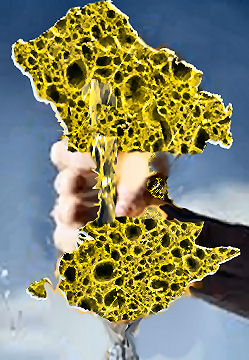
While the Murray-Darling Basin Authority apparently struggles to find even a paltry 3,000 gigalitres of water in its increasingly compromised attempt to restore the nation’s most vital and productive river system, a new report[1] reveals Australia to be the world’s largest net exporter of virtual water. This water is exported in crop, livestock and industrial products. It is the water consumed to create produce for export.
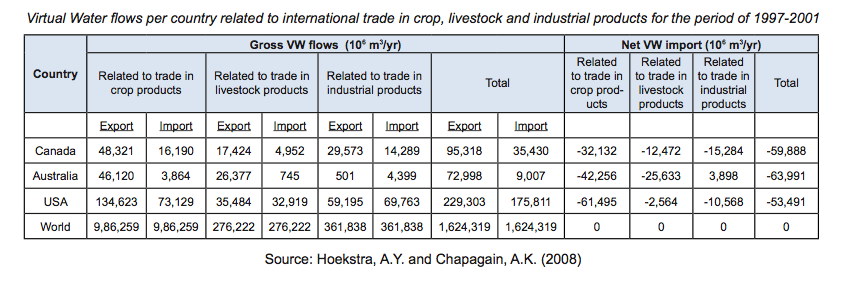 Independent data cited in the Canadian paper. It does not pertain to the time of the Australian drought.
Independent data cited in the Canadian paper. It does not pertain to the time of the Australian drought.
The report also indicates that our agricultural sector is responsible for the vast majority of the total volume of water exported from Australia in this way, shipping an average of 72,000 gigalitres of virtual water overseas every year.
“While few would question the important contribution made by most Australian farmers, it defies belief that a country continually struggling with unreliable rainfall and severe drought allows more virtual water to be lost than any other nation on the planet”, national coordinator of Fair Water Use, Ian Douglas, commented today.
He added, “This sad fact is made even more poignant when one considers that the Murray-Darling Basin Authority seems incapable of finding a mere 7,600 gigalitres of environmental water to ensure the health of our most important river system”.
“These statistics also confirm the arrant irresponsibility of applying Murray-Darling water to semi-desert country, irrigating water-intensive crops such as cotton - a product which largely heads offshore, together with the vast amount of virtual water it contains”, he concluded.
1. The report (PDF, 1.8MB) may be downloaded from the Fair Water Use web site.
Full media release and report may be viewed at: http://www.fairwateruse.com.au/content/view/317/48/, Fair Water Use Australia, 'striving for a revived Murray-Darling basin by supporting environmentally sustainable water-use'.
See also: Council of Canadians' new report: 'Leaky Exports: A portrait of the virtual water trade in Canada', WORLD WATER WARRIORS: ‘Canada a major exporter of virtual water, says new Council of Canadians report’, Leaky Exports: A Portrait of the Virtual Water Trade in Canada, Council of Canadians’ new report: Leaky Exports - A portrait of the virtual water trade in Canada. (Sites found with a Google search using terms "Leaky exports: A portrait of the virtual water trade in Canada" (quotes omitted), although we believe it inadvisable to indefinitely depend upon Google or other search engines finding such resources as seems to be the practice amongst some Internet users these days. That is why we prefer to add links rather than repeat the hackneyed phrase "Just google it". - Ed)
1. The report Leaky Exports: A portrait of the virtual water trade in Canada (PDF, 1.8MB) may be downloaded from the Fair Water Use web site.
 Murray Darling Basin Authority (MDBA) – independent authority or rubber stamp?
Murray Darling Basin Authority (MDBA) – independent authority or rubber stamp?
Over the last decade, the Murray-Darling Basin Authority and its predecessor the Murray-Darling Basin Commission have been hamstrung by the National Water Initiative, which is promoting the privatisation of Australia's water: to the joy of speculators and the dismay of those who understand the need to promote wise and sustainable use of the nation's water.
News that neither the Federal Environment Minister nor the new Chair of the Murray-Darling Basin Authority are willing to endorse current members of the MDBA board will come as no surprise to many Australians, according to a statement released by public water rights and environmental advocacy group, Fair Water Use (Australia):
“The Federal Government has clearly been backed into a corner by the partisan and occasionally outrageous behaviour of those who view water as a private commodity rather than an invaluable common resource which must be managed carefully for all Australians.
There is little doubt that the pressure tactics of maverick sections of the irrigation lobby, and corporate players increasingly investing in Australian water, have already precipitated the resignations of the previous Chair and one board member, both possessing a wealth of experience in environmental matters - and it is highly likely that more resignations will follow.
Over the last decade, the Murray-Darling Basin Authority and its predecessor the Murray-Darling Basin Commission have been hamstrung by the National Water Initiative, which is promoting the privatisation of Australia's water: to the joy of speculators and the dismay of those who understand the need to promote wise and sustainable use of the nation's water.
There are serious concerns that we are witnessing the final stages of the shameful rebadging of the Authority from guardian of the Murray-Darling to a mere rubber stamp for politically expedient, cynical policies which will only promote continuation of the overexploitation of the nation’s most vital river system.
It is entirely unacceptable that Australians have been deprived of their democratic right to determine whether this country’s water is protected as a common good or treated as a commodity to be traded on global financial markets.”
Source: Media Release from Fair Water Use, 7th March 2011
ScienceDaily (Oct. 1, 2010) — The world's rivers, the single largest renewable water resource for humans and a crucible of aquatic biodiversity, are in a crisis of ominous proportions, according to a new global analysis.
The report, published Sept. 30 in the journal Nature, is the first to simultaneously account for the effects of such things as pollution, dam building, agricultural runoff, the conversion of wetlands and the introduction of exotic species on the health of the world's rivers.
The resulting portrait of the global riverine environment, according to the scientists who conducted the analysis, is grim. It reveals that nearly 80 percent of the world's human population lives in areas where river waters are highly threatened posing a major threat to human water security and resulting in aquatic environments where thousands of species of plants and animals are at risk of extinction.
"Rivers around the world really are in a crisis state," says Peter B. McIntyre, a senior author of the new study and a professor of zoology at the University of Wisconsin-Madison's Center for Limnology.
The Nature report was authored by an international team co-led by Charles J. Vörösmarty of the City University of New York, an expert on global water resources, and McIntyre, an expert on freshwater biodiversity.
Examining the influence of numerous types of threats to water quality and aquatic life across all of the world's river systems, the study is the first to explicitly assess both human water security and biodiversity in parallel. Fresh water is widely regarded as the world's most essential natural resource, underpinning human life and economic development as well as the existence of countless organisms ranging from microscopic life to fish, amphibians, birds and terrestrial animals of all kinds.
Over many millennia, humans have exerted an increasingly pervasive influence on fresh water resources. Rivers, in particular, have attracted humans and have been altered through damming, irrigation and other agricultural and engineering practices since the advent of civilization. In recent times, chemical pollution, burgeoning human populations, and the accidental as well as purposeful global redistribution of plants, fish, and other animal species have had far-reaching effects on rivers and their aquatic inhabitants.
"Flowing rivers represent the largest single renewable water resource for humans," notes Vörösmarty. "What we've discovered is that when you map out these many sources of threat, you see a fully global syndrome of river degradation."
What jumps out, say McIntyre and Vörösmarty, is that rivers in different parts of the world are subject to similar types of stresses, such things as agricultural intensification, industrial development, river habitat modification and other factors. Compounding the problem is that some of the negative influences on rivers arrive in indirect ways. Mercury pollution, for example, is a byproduct of electricity generation at coal-fired power plants and pollutes surface water via the atmosphere.
"We find a real stew of chemicals flowing through our waterways," explains Vörösmarty, noting that the study represents a state-of-the-art summary, yet was unable to account for such things as threats from mining, the growing number of pharmaceuticals found in surface water and the synergistic effects of all the stresses affecting rivers.
"And what we're doing is treating the symptoms of a larger problem," Vörösmarty explains. "We know it is far more cost effective to protect these water systems in the first place. So the current emphasis on treating the symptoms rather than the underlying causes makes little sense from a water security standpoint or a biodiversity standpoint, or for that matter an economic standpoint."
Among the startling conclusions of the study is that rivers in the developed world, including much of the United States and Western Europe, are under severe threat despite decades of attention to pollution control and investments in environmental protection. Huge investments in water technology and treatment reduce threats to humans, but mainly in developed nations, and leave biodiversity in both developed and developing countries under high levels of threat, according to the new report.
"What made our jaws drop is that some of the highest threat levels in the world are in the United States and Europe," says McIntyre, who began work on the project as a Smith Fellow at the University of Michigan. "Americans tend to think water pollution problems are pretty well under control, but we still face enormous challenges."
The hard lessons learned by the developed world, says McIntyre, can help governments and planners in other parts of the world avoid making the same mistakes and experiment with new strategies for promoting water security and protecting biodiversity. Instead of investing billions of dollars in expensive remediation technologies, strategies such as protecting watersheds, for example, can reduce the costs of drinking water treatment, preserve floodplains for flood protection and enhance rural livelihoods.
Rivers of the world least at risk are those where human populations are smallest. Rivers in arctic regions and relatively inaccessible areas of the tropics appear to be in the best health.
The analysis used data sets on river stressors around the world. Built into state-of-the-art computer models, the data yield maps that integrate all of the individual stressors into aggregate indices of threat. The same strategy and data, say Vörösmarty and McIntyre, can be used by governments worldwide to assess river health and improve approaches to protecting human and biodiversity interests.
"We've created a systematic framework to look at the human water security and biodiversity domains on an equal footing," Vörösmarty says. "We can now begin presenting different options to decision makers to create environmental blueprints for the future."
The work underpinning the study was funded by the Earth System Science Partnership, an international scientific consortium that supports research on global environmental change; the Bonn-based Global Water System Project, an interdisciplinary research effort to articulate human-water interactions; and the freshwater BIODIVERSITAS project of Paris-based DIVERSITAS, an international collaborative whose mission includes providing accurate scientific information related to issues of biodiversity. The work was also supported by the National Science Foundation, NASA, the Global Environmental Facility, and the Society for Conservation Biology's Smith Fellowship Program.
In addition to McIntyre and Vörösmarty, authors of the Nature report include Mark Gessner of the Swiss Federal Institute of Aquatic Science & Technology; David Dudgeon of the University of Hong Kong; Alex Prusevich and Stanley Glidden of the University of New Hampshire; Pamela Green of the City University of New York; Stuart Bunn of Griffith University, Australia; Caroline Sullivan of Southern Cross University, Australia; Cathy Reidy Liermann of the University of Washington; and Peter Davies of the University of Western Australia.
Originally published on-line in Science Daily.The above story is reprinted (with editorial adaptations by ScienceDaily staff) from materials provided by University of Wisconsin-Madison. The original article was written by Terry Devitt. See also: Murray Darling Basin plan must not become a political football, Fair Water Use
 Remember the lesson of the great Newfoundland cod fisheries. Rudyard Kipling’s Captains Courageous gives a description of fish so plentiful that the waters seethed with them. In 1977 Canada tried to stop the reduction of the cod stocks by declaring 320 kilometers off Newfoundland off limits to foreign factory ships. The local industry flourished, bringing prosperity to Newfoundland. In the 1980s marine biologists warned that the future was threatened by the heavy fishing and recommended an annual target of 125,000 tonnes of cod. But the community outcry about the economic and social damage made the government set the target at 235,000 tonnes. Stocks fell below a sustainable level and in June 1992 one of the richest natural resources was closed down. 30,000 jobs were lost and Newfoundland fell into rapid economic decline.
Remember the lesson of the great Newfoundland cod fisheries. Rudyard Kipling’s Captains Courageous gives a description of fish so plentiful that the waters seethed with them. In 1977 Canada tried to stop the reduction of the cod stocks by declaring 320 kilometers off Newfoundland off limits to foreign factory ships. The local industry flourished, bringing prosperity to Newfoundland. In the 1980s marine biologists warned that the future was threatened by the heavy fishing and recommended an annual target of 125,000 tonnes of cod. But the community outcry about the economic and social damage made the government set the target at 235,000 tonnes. Stocks fell below a sustainable level and in June 1992 one of the richest natural resources was closed down. 30,000 jobs were lost and Newfoundland fell into rapid economic decline.
The lesson for the health of the Murray River is clear. (See Peter Goodwin’s letter in the AGE, October 2010)
Millions of us depend upon this river. We cannot repeat the mistake of Newfoundland when scientists warn us of consequences of letting it die.
Is water wasted that is not directly used now by the people? Is it wasted if it keeps the river alive for our future use, if it floods the plains where the red gums grow, or keeps alive the swamps, which the migrating birds, and other wildlife depend upon? This is a question, which must be answered by us all now, for the sake of the future.
Four States of Australia squabble over what water there is – Queensland, where much of the water originates, New South Wales and Victoria which have the problem of whether to keep the trees of the flood plains alive, and South Australia, where the river used to flow into the sea, and is now struggling to keep the lakes and estuary alive, as well as the capital of Adelaide.
Water waste by irrigators and country towns is now greatly reduced by more enlightened practices, but some areas are more progressive than others. It is still not worked out which crops are best suited to different areas, especially with water-hungry cotton and rice. Other crops such as dried fruit would prosper more if they could compete with Middle Eastern imports, which have low labor costs but a high real cost in freight, which adds to carbon emissions and fuel loss.
There are some crops necessary for feeding our population, which it would be wiser to grow to some extent at least, in our fertile Murray River Basin, than rely entirely on imports. Water is a scarce commodity the most of the world, and we use the water overseas for our imported food too.
A great waste of the Murray River is the private ownership of water. This means that government must pay private interests for water to use in the public interest. Originally far-seeing legislators in Victoria decreed that all water belonged to the state, which gave irrigators and others the rights to use it. Unfortunately this right has become a right to own it. Not only irrigators but financial interests have now got a source of income that costs the Murray River and the State dearly. A title system for the use of water similar to land ownership would be disastrous for this dry country.
Farmers and States trading rights to use water on an annual basis is one thing. To have titles to private ownership of water is reckless.
Water ownership would inevitably accumulate into the hands of a few. There would be no legal way to prevent foreign ownership. Greedy people have their eyes on water ownership globally, as with growing population pressures it becomes the most valuable commodity on earth. The pressure on governments from these private interests may be great, and must be resisted.
There is such a thing as treason, and selling away our life-blood is one of them. Although distribution can be allowed through private companies, and private interests assist in infrastructure, the living water itself must remain inalienably in public ownership, and subject to public control. Free trade agreements must never have a legal chance to include water.
The stupidest waste of the Murray River is the North-South Pipeline of Victoria, built by the Victorian government to keep the Melbourne electorates happy, takes water down south for Melbourne, which otherwise would flow down the Goulburn River to the Murray River and associated irrigators.
The aboriginal inhabitants for 40,000 years lived sustainably on the banks of the river, and harvested its wildlife without extinction, keeping their population within the bounds of existing technology, droughts and floods.
Recent comments